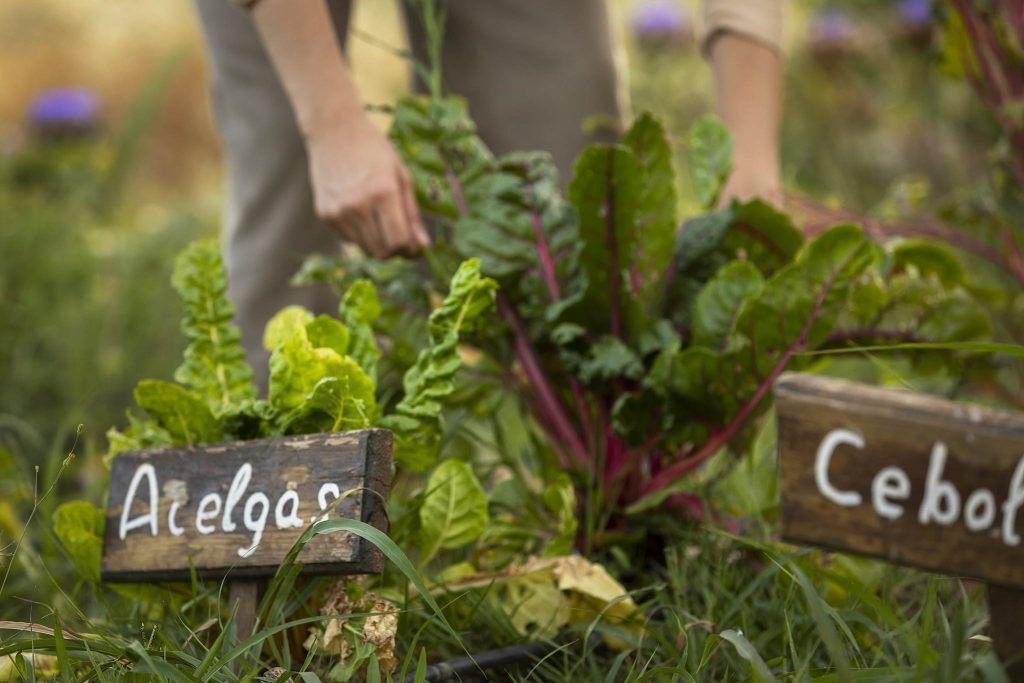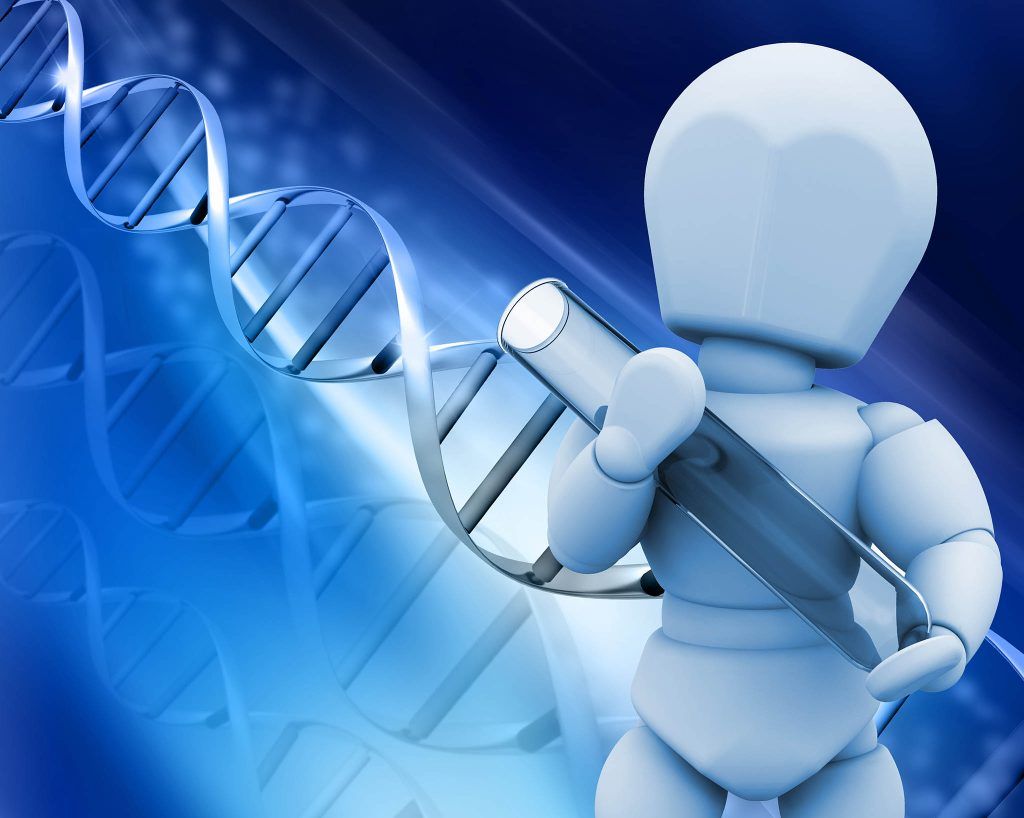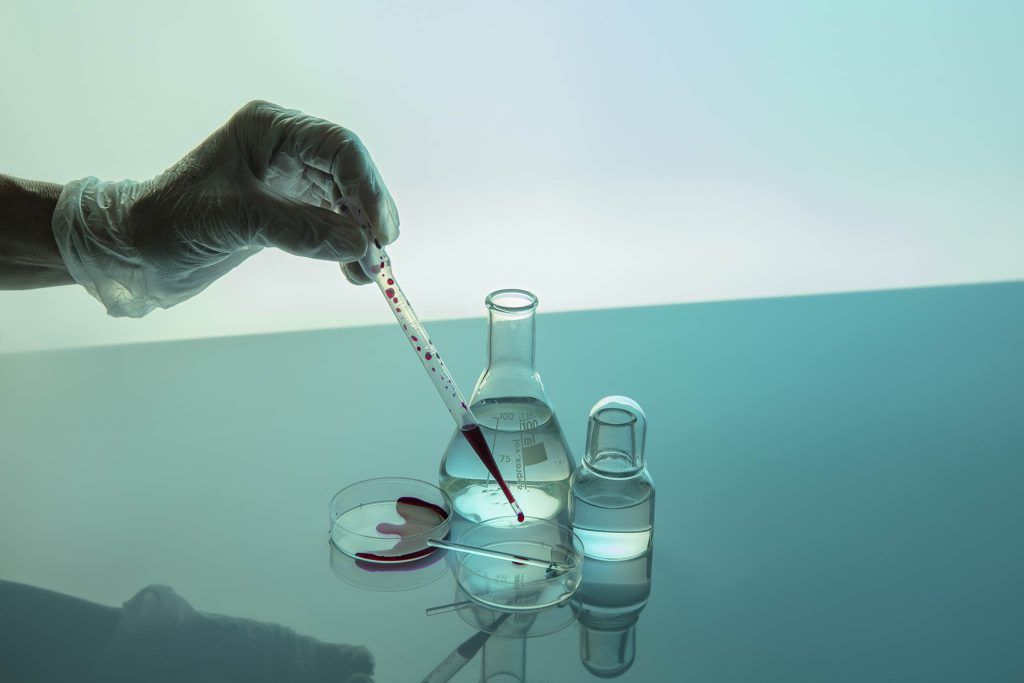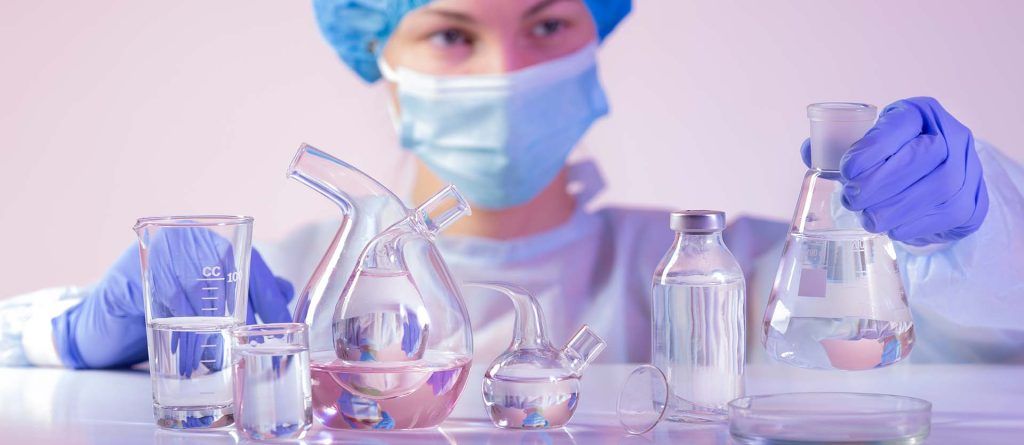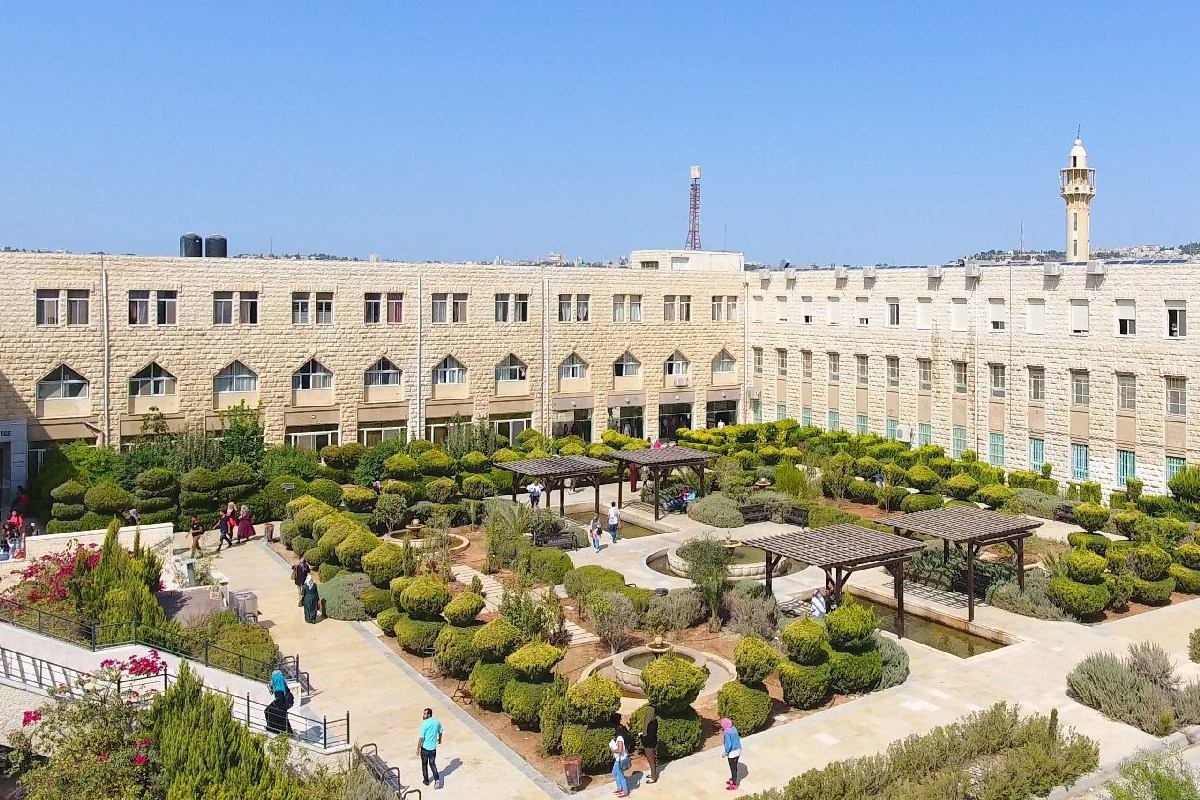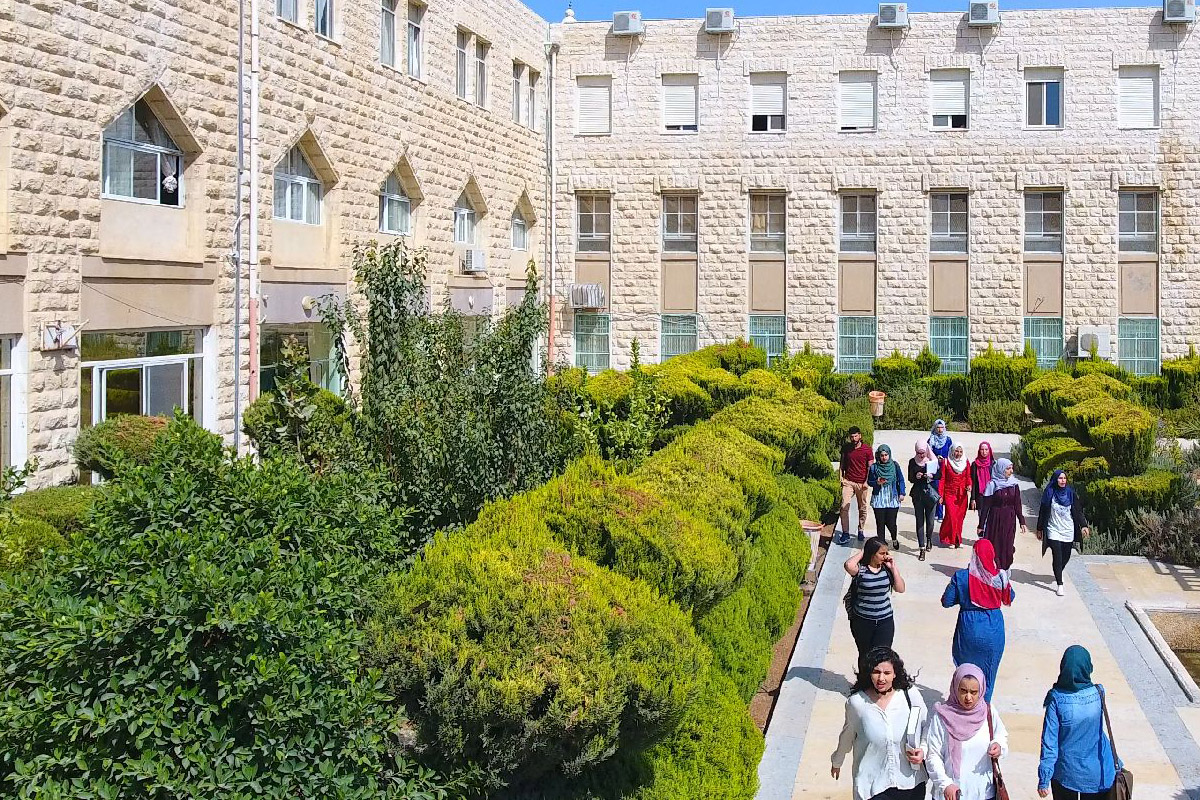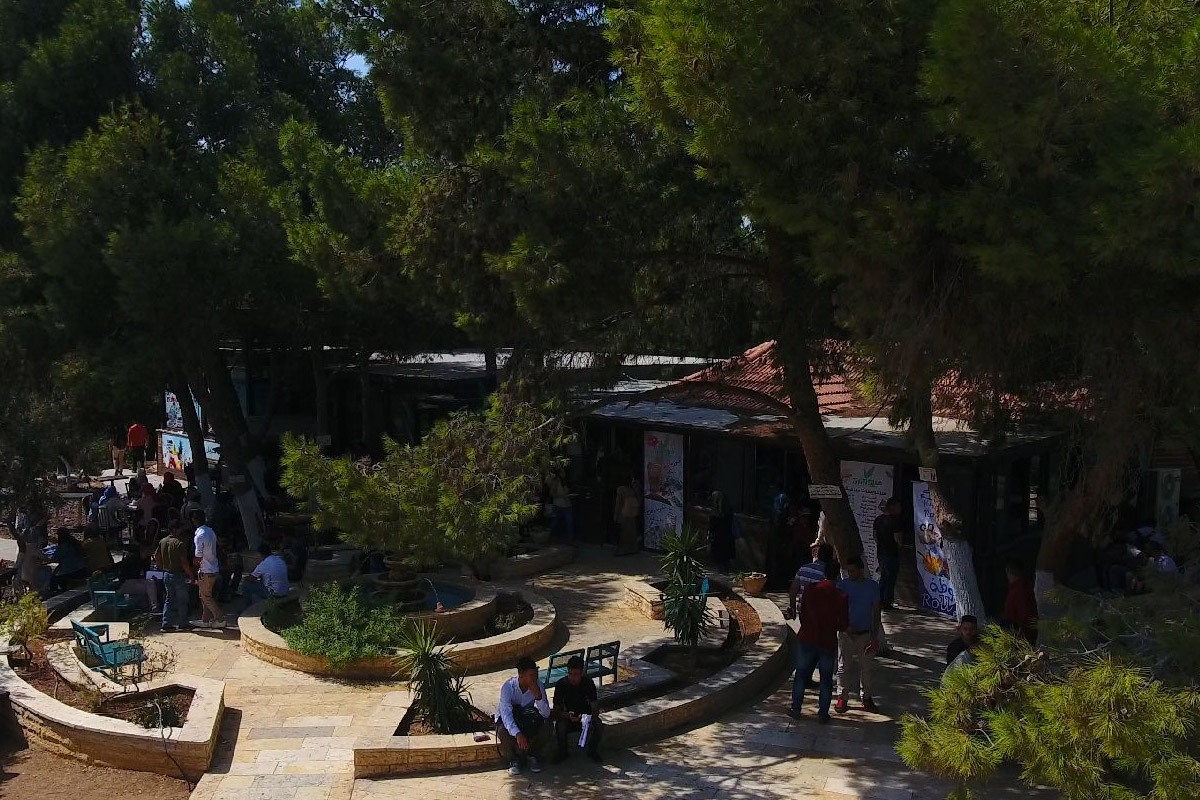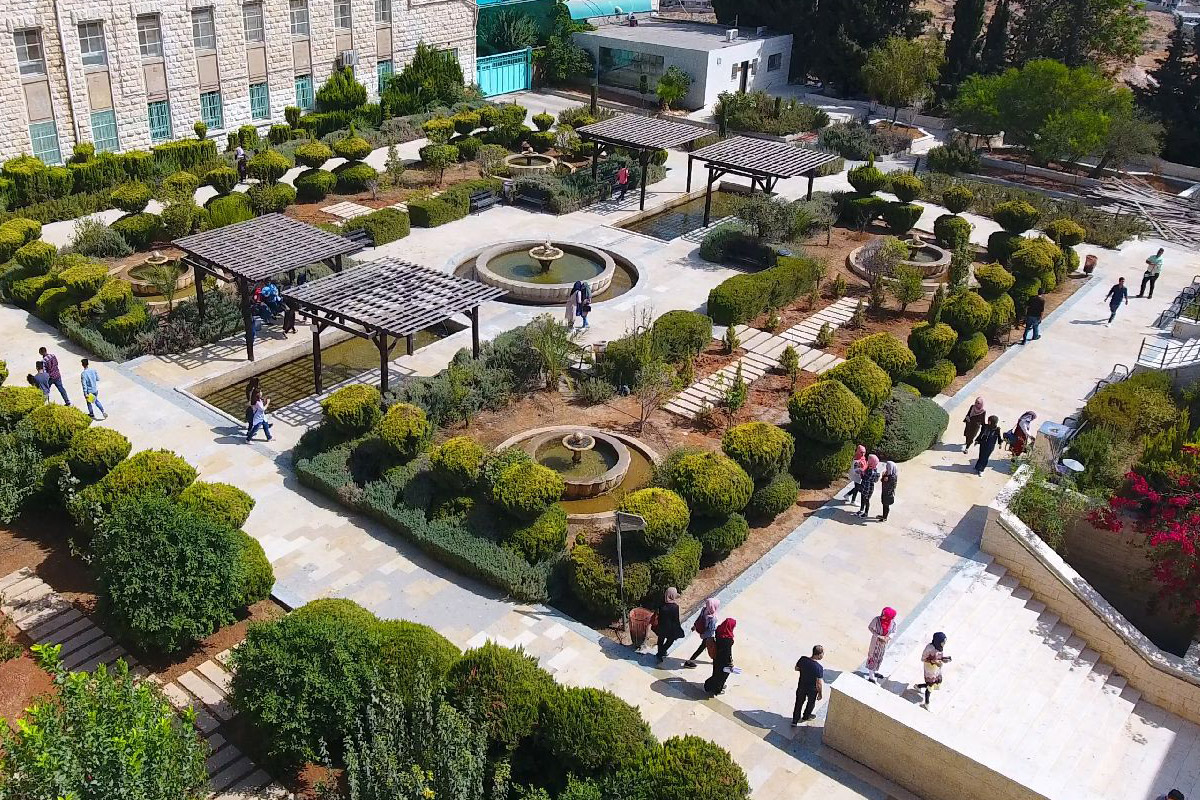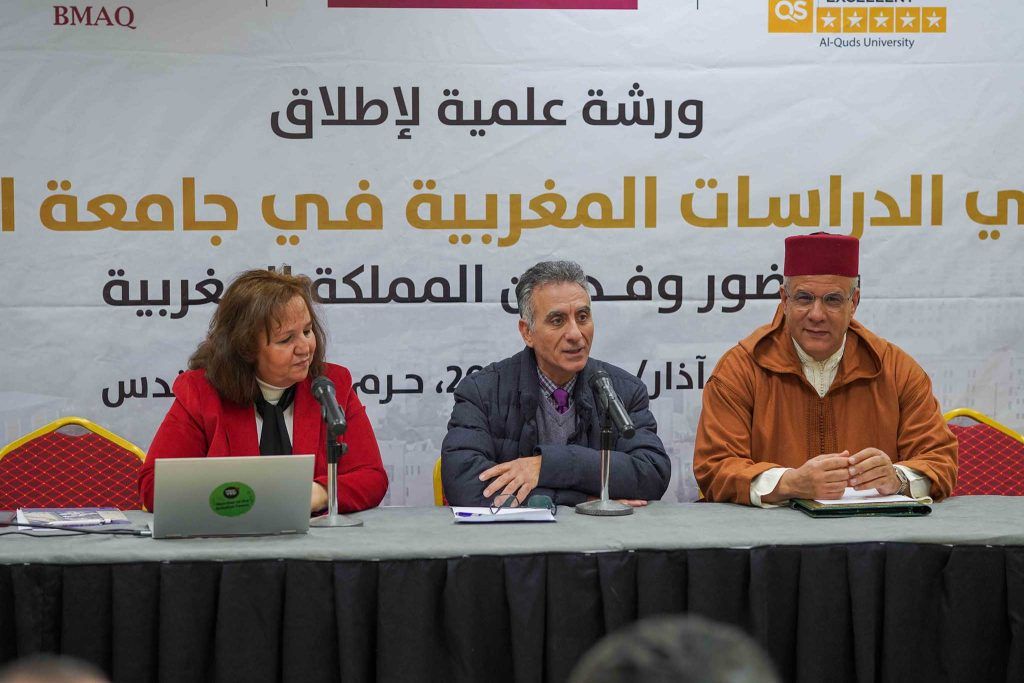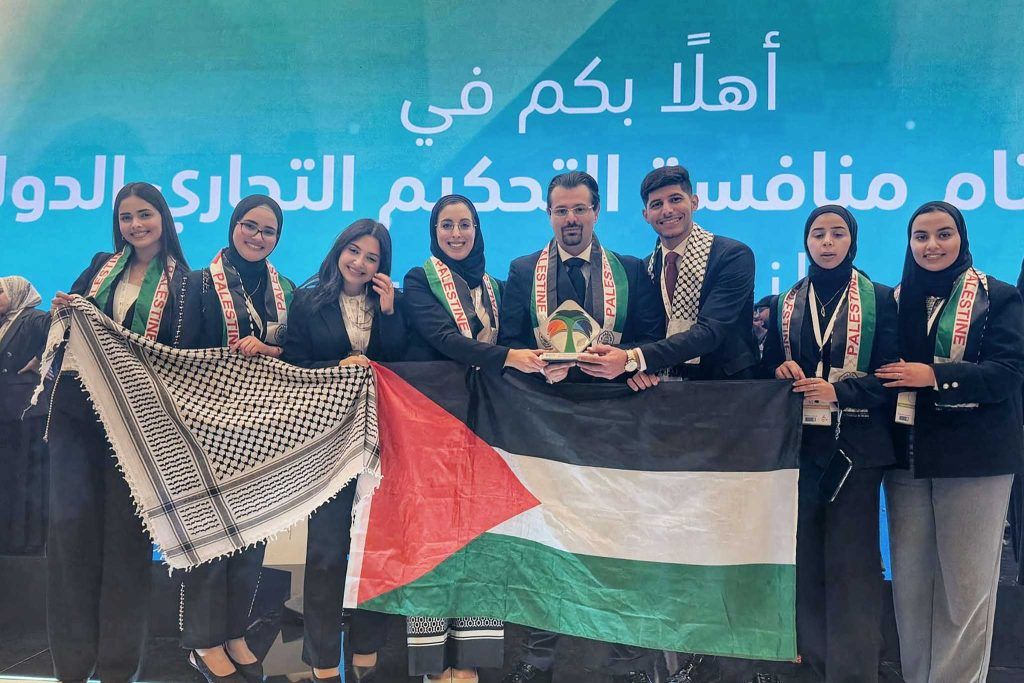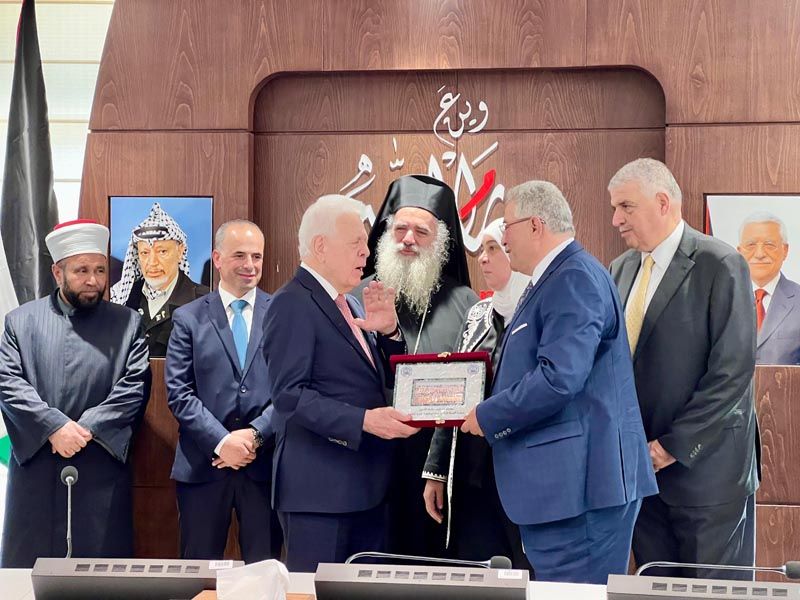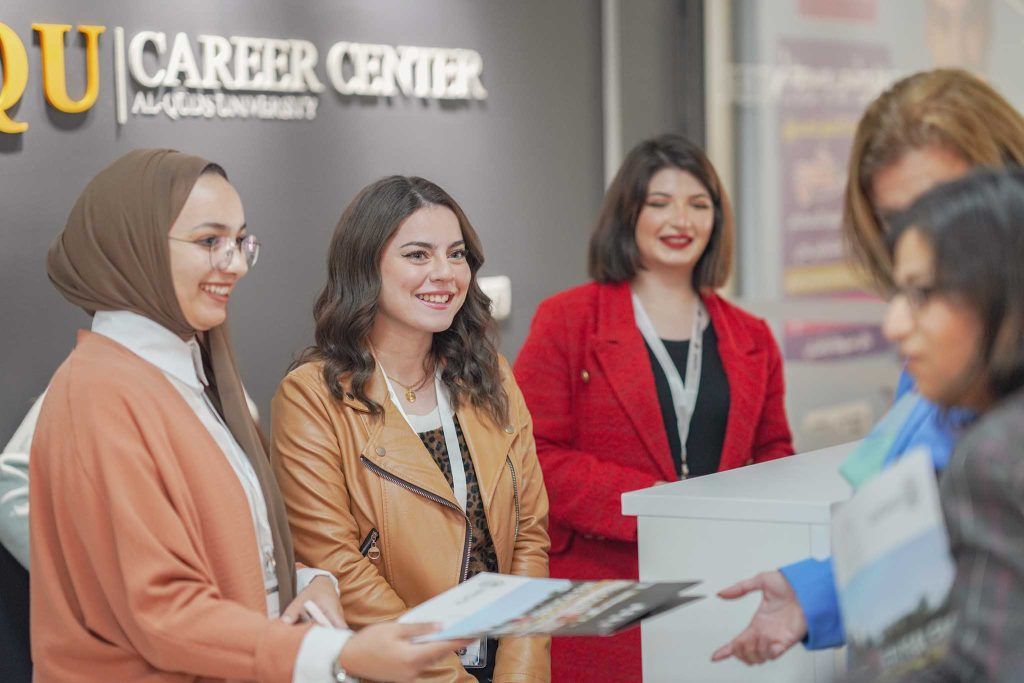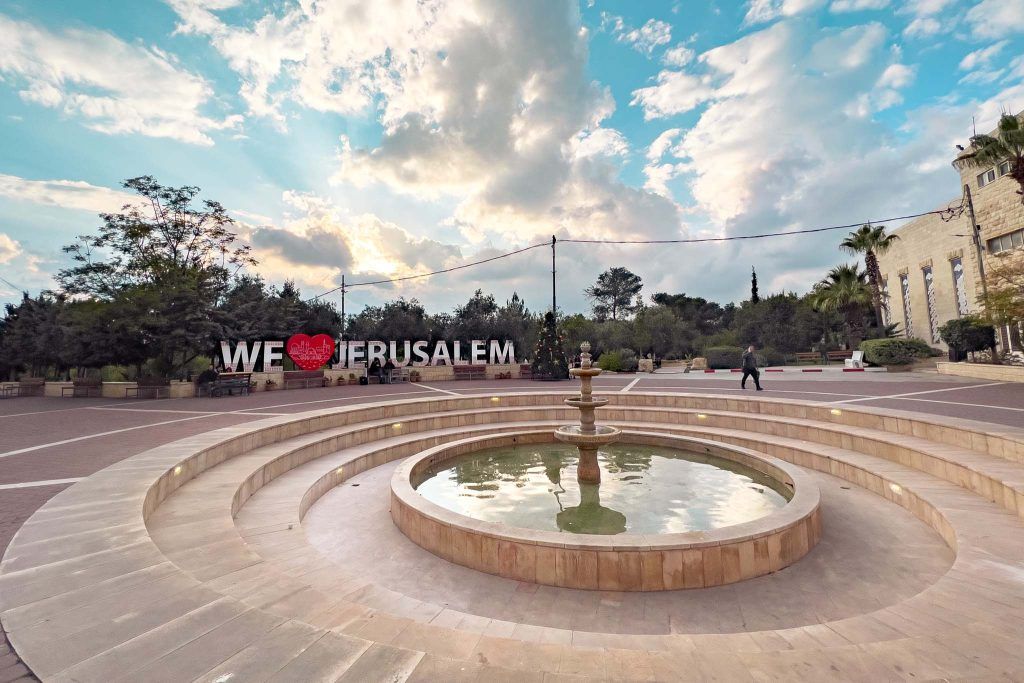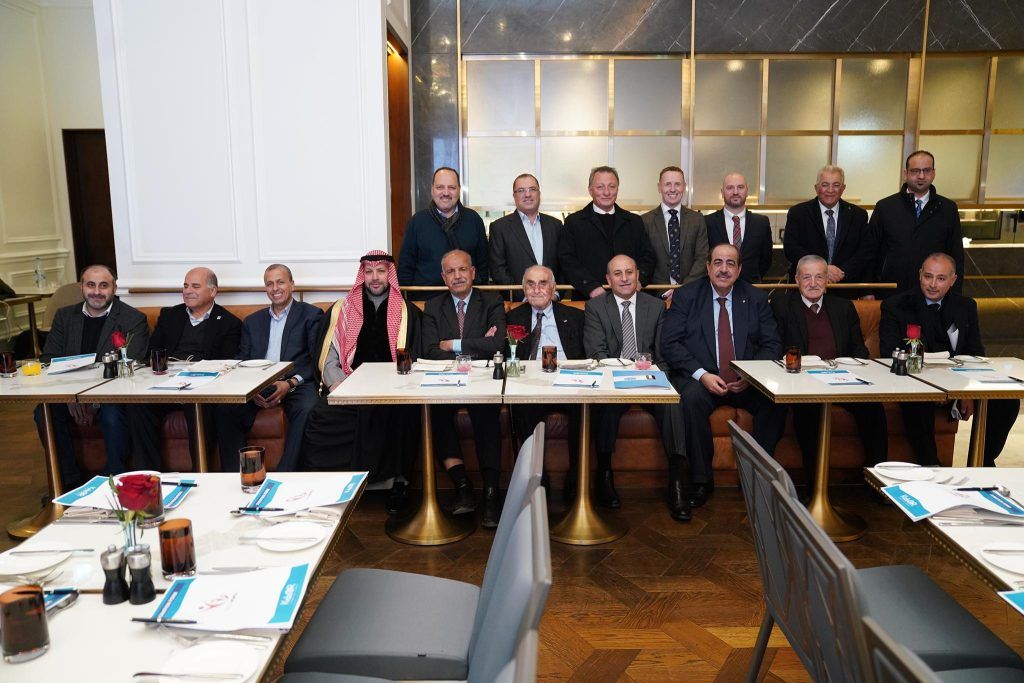Faculty of Science and Technology
The College of Science and Technology is the intellectual heart of Al-Quds University.
Programs list
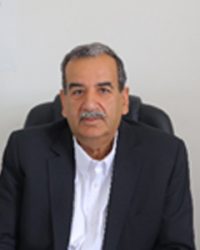
Dr. Mohammad Abu Al-Haj
Dean of the Faculty
The College of Science and Technology consists of Science and Technology departments (Chemistry and Chemical Technology, Department of life Sciences and Medical Technology, Computer Science, Information Technology (Dual Studies), Mathematics, and Physics).
The College of Science and Technology consists of Science and Technology departments (Chemistry and Chemical Technology, Department of life Sciences and Medical Technology, Computer Science, Information Technology (Dual Studies), Mathematics, and Physics). Science probes the essence of things, and technology benefits humankind by applying its findings. We at the College of Science and Technology believe that the two definitely cannot be separated from each other, and consequently have taken their fusion as our philosophy of education.
In modern society, which is characterized by the fast-paced advancement of science and technology, researchers deal with a diversity of new issues. Out of a belief in the need for the basics under these circumstances, the College of Science and Technology has prepared a curriculum emphasizing fundamentals. More specifically, there are many basic science classes in the first and second years. Studies center on specialized courses in the third year, and students heighten their capacity for thinking and solving problems on their own initiative through graduation research and design in their fourth year. Upon graduation from undergraduate studies, many students go on to graduate school. The graduate school produces researchers who acquire a more sophisticated ability to discover and resolve problems through more specialized studies and are equipped for extensive activity in society. The academic programs are designed to achieve excellence in education, tailored to be dynamic that evolve in line with future changes, and are thoroughly planned to prepare students for future careers and graduate studies.
To assist in achieving these goals, the faculty is equipped with modern laboratories for scientific research in various fields of science and technology. We believe that the modern university requires extensive attention and communication to academic and research cooperation at the local, national and global level. We also developed cooperative relations and interaction with the local community, industry and the private sector.
The College of Science and Technology is located on Abu Dies Campus, which is close to the city of Jerusalem and offers a fine environment with an abundance of green. We strongly encourage prospective students to visit the Campus.
Dr. Mohammad Abu Al-Haj
Dean of the Faculty
Faculty of Science and Technology
The College of Science and Technology is the intellectual heart of Al-Quds University. The College was established in 1979 as one of the oldest University Colleges in Palestine, and the first of Al-Quds University.
With departments, academic centers encompassing studies in natural sciences, we offer an exciting range of options. Our students develop strengths as communicators, critical thinkers, problem solvers and lifelong learners who can see the big picture. They have the skills and adaptability that employers universally value. Graduates are not only prepared to effectively compete in the marketplace, but they have a solid foundation to excel in an increasingly global, technological and interdisciplinary world.
In order to fulfill the needs of the society for qualified specialists capable of dealing with academic, research and service challenges, the college of science and technology had the vision of competition and the ability to develop and renew programs with learning outcomes to suit the needs of society and market.
The College of Science and technology creates an environment of research by supporting the different centers of research and analysis in various fields. These distinguished centers are The Biochemistry laboratory: Specialized in Malaria studies, well known internationally, Parasitological Research laboratory, Biodiversity center, Organic Synthesis laboratory, Water and soil center, Environmental Studies center, Radiation center Marine research center, Agriculture research center Space physics laboratory
In addition, Al-Quds Center for Measurement and Analysis is directed by the Faculty of Science and Technology is a certified service center that serves the community in addition to researchers.
The Faculty of Science and Technology has departments: Mathematics, Physics, Earth & Environmental Sciences, Computer Science, Information Technology (Dual Studies) Chemistry and Chemical Technology, and Life Sciences. The Faculty of Science is a place for education and research. Science is a study to understand the principles and laws working in the natural world. We strive to unravel the mysteries of nature, asking simple questions such as “why?” and “How?” The principle incentives to do most research activities lie in pure interest, and human wisdom has been accumulated in this manner for many generations.
The College of Science and Technology had developed new Professional Programs leading to BSc. Degree in Science. These programs are applied Science programs. The graduates will experience a range of courses in basic, applied, experimental, and will be trained in the field of Study. The graduates will be able to develop their own projects.
Offered Programs
Academic Staff
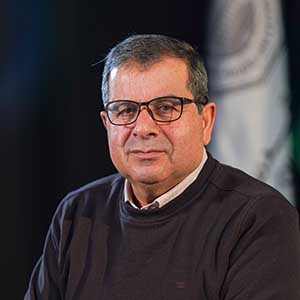
Teaching Courses: Sampling Techniques, Analysis of Time Series, Data Science, Machine Learning, Regression Analysis, Probability Theory, Mathematical Statistics, Missing Data, Categorical Data Analysis, Multivariate Statistics.
Dr. Abdulhakeem Eideh is an Associate Professor of survey statistics and methodology at Al-Quds University. For the last 18 years, he serves also as an international expert and consultant in sampling and survey methodology, to international organizations, with high level in research and trainer in official statistics and sampling.
In the year 2015.
Mr. Eideh received the best paper prize in the field of sampling awarded by the Indian Society of Agricultural Statistics, New Delhi (during 2012 and 2013). Mr. Eideh has PhD. from Hebrew University of Jerusalem (1998-2002), M.Sc. (1987) and B.Sc. (1984) in statistics from Yarmouk University of Irbid. Mr. Eideh is a member ISI and IASS, and elected member of UAS (2011-2015).
Abdulhakeem Eideh’s research interests include: Analytic inference from complex sample surveys; Poverty indicators, small area estimation; Inference under informative sampling with applications to time series models, cross-sectional and longitudinal observations, and missing not at random nonresponse.
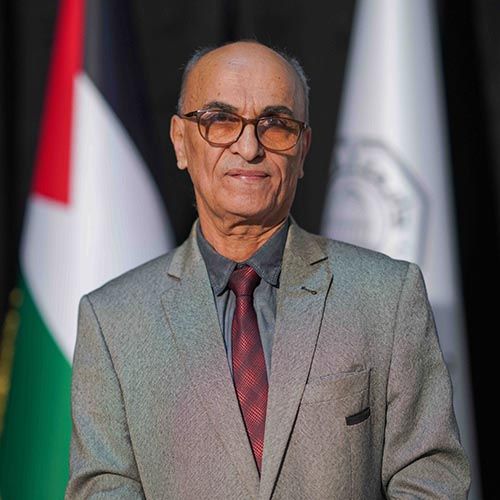
Professor of Applied Nuclear Physics. Born in Bethlehem, Palestine 1960. Holder of two doctorate degrees in Nuclear sciences from the University of Comenius and the Research
Institute of Preventive Medicine – Slovak Medical University in Bratislava, Slovak Republic.
During his study, he was working as research assistant at the Institute of Preventive and Clinical Medicine – Slovak Medical University in Bratislava, where he later became a senior research scientist in the field of radiation protection and dosimetry.
His research was focused on the Human body monitoring of internal radioactive contamination, Gamma spectroscopy, emergency and post – accidental monitoring. After his return to Palestine in 1997, Dr. Lahham joint Al-Quds University in Jerusalem where he worked at the Departments of Earth & Environmental Science, Medical imaging and physics.
In the year 2005 he established the Center for Radiation Science & Technology at Al-Quds University. Since its foundation, the center is active in research and technology transfer in the fields of ionizing and non-ionizing radiation. Dr. Lahham is a senior researcher in the field of non-ionizing radiation. He has published a lot of works about environmental radiofrequency radiation. From 2009 to 2012 Dr. In 2013 he acted as a visiting professor Dean of Allied Medical Sciences at Ahliya University– Bethlehem. Lahham was the Dean of the Faculty of Science and Technology. Since 2020 he is the Secretary – General of Al-Quds University Councils.
He is a member of distinguished local and international organizations: member of the International Advisory Committee of the
International Electromagnetic Fields Project – WHO.
Co-founder – Palestine supreme council for creativity and innovation. Member of Editorial board of the International Journal of Nuclear and Particle Physics, International Journal of Radiology, International Journal of Nuclear medicine & radioactive substances, .
Author of more than 40 publications in English, Slovak & Arabic languages. Dr. Lahham has supervised a number of MSc. Students in Europe and Palestine
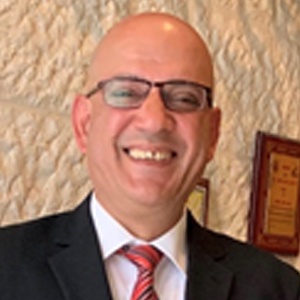
Dr. Amer Kanan is an assistant professor in Environmental Engineering and Sciences and a faculty member of the Environment and Earth Science Department at Alquds University, Palestine. Kanan worked as an Assistant for Academic Affairs Vice President. The former head of the Environment and Earth Sciences Department at the College of Science and Technology at Al-Quds University and former Coordinator for the Master’s Program in Environmental Science at the University. Dr. Kanan has published many peer-reviewed journal papers related to water and water treatment. He mainly teaches Environment and Pollution Prevention, Environment and Public Health, Environment and Sustainable Development, Environment and Social Ecology, Energy and Environment Sustainability, and Organics in the Environment.
Interested in research in water treatment, water pollution, and water efficiency use and productivity. Also researching sustainable chain management in the agriculture sector. Interested in environmental education and awareness trainin.
Some recent publications:
Ateia, M., Kanan, A., Karanfil, T., 2020. Microplastics Release Precursors of Chlorinated and Brominated Disinfection Byproducts in Water. Chemosphere 251. https://doi.org/10.1016/j.chemosphere.2020.126452
Ersan, G., Ersan, M.S., Kanan, A., Karanfil, T., 2021. Predictive modeling of haloacetonitriles under uniform formation conditions. Water Res. 201, 117322. https://doi.org/10.1016/j.watres.2021.117322
Hethnawi, A., Khderat, W., Hashlamoun, K., Kanan, A., Nassar, N.N., 2020. Enhancing Chromium (VI) removal from synthetic and real tannery effluents by using diatomite-embedded nanopyroxene. Chemosphere 252. https://doi.org/10.1016/j.chemosphere.2020.126523
Kanan, A., Karan, T., 2020. Estimation of haloacetonitriles formation in water : Uniform formation conditions versus formation potential tests 744, 1–6. https://doi.org/10.1016/j.scitotenv.2020.140987
Kanan, A., Soyluoglu, M., Karanfil, T., 2021. Removal of the precursors of regulated DBPs and TOX from surface waters and wastewater effluents using mixed anion exchange resins. Chemosphere 263, 1–8. https://doi.org/10.1016/j.chemosphere.2020.128094
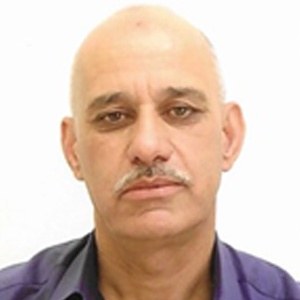
Mr. Awni Abu Tair is Lecturer at the Department of Computer science. Mr. Awni Abu Tair teaches courses for undergraduate students in the Department of Computer and Information Technology Department in the Faculty of Dual Studies and also some courses in the Najjad Zeenni Faculty of Engineering and some courses at al-Quds Bard College. Participated in the construction of a new plan for the Computer Department, which will be applied starting from the first semester of the academic year 2019-2010.
He joined the Department in 1986 as a research and teaching assistant after receiving a bachelor’s degree in Computer Science from the College of Science and Technology. He obtained a master’s degree in science education in 1998 from Al-Quds University and worked as a teacher in the Department. Then he has been a lecturer in the computer department. He received a Master’s Degree in Computer Science in 2005 from Al-Quds University and since then has been a lecturer in the Department of Computer Science.
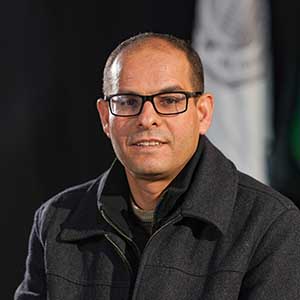
Dr. Fuad Al-Rimawi is Associate Professor of Analytical Chemistry. He received his Bachelor’s degree in chemistry from Birzeit University in 1998, and then he obtained a master’s degree in chemistry from the University of Jordan in 2002. He received a doctorate in analytical chemistry in 2007 from the University of Marburg, Germany. Since 2008, he has been working in the Department of Chemistry at Al-Quds University.
Dr. Fuad Al-Rimawi contributed to the development of analytical chemistry and instrumental analysis courses, in addition to his membership in a number of committees at the university. He was awarded the Active Researcher Award at the College of Science and Technology, in addition to the award for the highest impact factor for his research publications at Al-Quds University.
He was awarded the German DAAD Scholarship to complete his Ph.D. from 2003-2007 in addition to a Fulbright Scholarship in 2018 for post-doctoral research.
The field of research interests: Extraction of medicinal plants, analysis of their active substances and study of their biological effectiveness, in addition to the use of these extracts in many applications as natural preservatives and antioxidants.
Dr. Al-Rimawi has published many publications in international journals, including:
1- Fuad Al-Rimawi, Faraj Hijaz, Yasser Nehela, Ozgur Batuman, Nabil Killiny, Uptake, translocation, and stability of oxytetracycline and streptomycin in citrus plants, Antibiotics, submitted, 2019. Manuscript ID: antibiotics-609938
2- Nabil Killiny, Faraj Hijaz, Fuad Al-Rimawi, Yasser Nehela, Ozgur Batuman, Translocation of Oxytetracycline in Citrus Plants after Root Drench and Stem Delivery, Proc. Fla. State Hort. Soc. 132:68-71. 2019.
3- Saleh Abu-Lafi, Fuad Al-Rimawi, Jehad Abbadi, Khaled Qabaha, Saleh Naser, Separation and identification of phenolics from wild Pistacia palaestina extract and its antioxidant activity (JMPR/21.04.20/6969), Journal of Medicinal Plant Research, 2020, accepted.
4- Faraj Hijaz, Fuad Al-Rimawi, Christor I Vincent, Nabil Killiny
Observations on the movement of oxytetracycline within citrus plants, Antibiotics, Accepted 2020. Manuscript ID: antibiotics-738914.

Teaching Experience:
Hana Hirbawi\Shawwa taught the courses: Introduction to Computer Science, Fundamental of programming, Object Oriented Programming, Advanced Programming, Data Structures and Algorithms, Automata Theory, Computer Graphics and Image Processing, Artificial Intelligence, Software Engineering.
Academic History :
Hana Hirbawi\Shawwa is a lecturer in Computer Science Department in the Faculty of Science and Technology .
She is working in this College since 2002, where she worked for one year as a teacher assistant at Al-Quds University in Computer Science Department for bachelors, she worked as a teacher for nine years in Computer Science Department at Alquds University, and a lecturer for more than 9 years in Computer Science Department and Information Technology Department for Dual Studies at Alquds University.
Hana Hirbawi\Shawwa shared in the development of courses in computer science and study plans for Bachelor.
Hana Hirbawi\Shawwa obtained the Master degree in the Computer Science in parallel programming in 2003 from Alquds University, she obtained the Bachelor degree in Computing Information System in 1997 from the Alquds Open University.
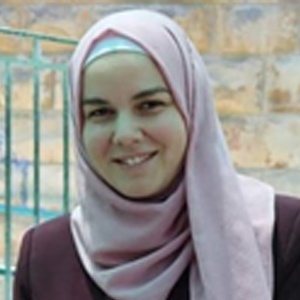
Ms. Hana Neirukh is a teacher at Al-Quds University since 2010. She is a teacher at the computer science and IT department and at the IT Dual Studies Department.
She teaches courses like Software Engineering, Web and Mobile Development, Human Computer Interaction.
She was the head of the computer science department in the academic year 2016/2017.
Ms. Hana is also the training coordinator at the Al-Quds University Business Center and coordinating trainings with Microsoft, Automation Anywhere and Informatica.
Ms. Hana studied Computer Science at the Technical University of Vienna with minor in Software Engineering.
She graduated with a master’s degree in 2005.
Courses: Software Engineering, Web and Mobile Development,
Human-Computer Interaction, Special Topics in IT, Serious Gaming
Office Hours: Saturday, Monday, Wednesday 11:00 – 12:00
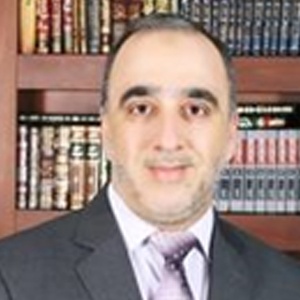
Dr. Hazem Doufesh obtained his Bachelor in Electronic Engineering from Alquds University, Palestine in 1999,Master in Computer Since degree from Alquds University, Palestine in 2005, and PhD degree in Biomedical Engineering from University of Malaya in 2014. He is currently assistant professor in the Physics Department in Faculty of Science and Technology / Al-Quds University. His research areas cover physiological measurement and modeling, Medical and health informatics. Currently, Dr. Doufesh is working on developing model for predicting and diagnostic epilepsy disease. He has published papers in ISI peer reviewed journals related to biomedical physics and signal processing.
7.Doufesh, H., F. Ibrahim, et al. (2018). “Application of Self Organizing Map For Correlation Hunting Between Alpha Band Power of EEG Signals And Other Physiological Parameters During Muslim Prayer (SALAT).” Biomedical Engineering: Applications, Basis and Communications 30(04): 1850029.
8. Doufesh, H., Ibrahim, F., Ismail, N. A. and Wan Ahmad, W. A. (2016).” Adaptive Neuro-Fuzzy Inference system for Predicting Alpha Band Power of EEG during Muslim Prayer (SALAT).” Biomedical Engineering: Applications, Basis and Communications 28(06): 1650043.
9. Doufesh, H., Ibrahim, F. and Safari, M., (2016). Effects of Muslims praying (SALAT) on EEG gamma activity. Complementary Therapies in Clinical Practice, 24, pp.6-10.
10. Doufesh, H., Ibrahim, F., Ismail, N. A., and Wan Ahmad, W. A. (2014). Effect of Muslim Prayer (SALAT) on α Electroencephalography and Its Relationship with Autonomic Nervous System Activity. The Journal of Alternative and Complementary Medicine, 20, 558-562.
11. Doufesh, H., Ibrahim, F., Ismail, N. A., and Ahmad, W. A. W. (2013). Assessment of Heart Rates and Blood Pressure in Different (SALAT) Positions. Journal of Physical Therapy Science, 25, 211-214.
12. Doufesh, H., Faisal, T., Lim, K.-S., and Ibrahim, F. (2012). EEG Spectral Analysis on Muslim Prayers. Applied Psychophysiology and Biofeedback, 37, 11-18.
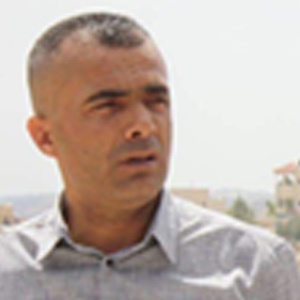
Dr. Husain Alsamamra is an associate professor in renewable energy and Biophysics and got his PhD on 2009 from Jaen University-Spain, and the master degree in nuclear physics in 2004 from Al-Quds University, Palestine, and the Bachelor degree in 2000 from Al-Quds University, Palestine.
Dr. Husain Alsamamra is a specialist in renewable energy and bio-physics at the college of science and technology. He joined the faculty of science and technology a year 2011. He is a member in different committees at the college of science and technology in addition to the national committees.
Dr. Alsamamra has been published more than 25 scientific research articles and supervised more than 10 master thesis and 1 PhD thesis in addition to the review of more than 7 research articles.
Teaching Experience:
General Physics (1, 2 & 3), Medical Physics, Waves and Vibrations, Optics, Modern Physics, Experimental Physics (senior level), Principle of Electronics, Electricity and Magnetism, Applied Mathematics for Engineers, Properties of Matter, Renewable Energy, Thermodynamics, Computational physics, Radiation physics, Classical Mechanic I, Classical Mechanics II, Advanced classical mechanics, Advanced Research methods and Innovations, Advanced concepts in physics, Advanced Mathematical physics, Renewable energy topics.
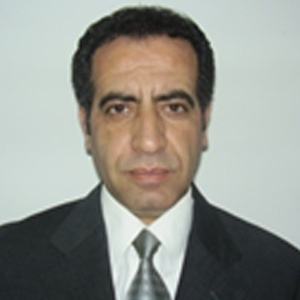
Dr. Hussein Alkam is associate professor of inorganic chemistry. He attended the collage in 1999. He was a head of the department for two years, Coordinator of the postgraduate studies program in Applied and Industrial Technology for two years also,
Dr. Alkam supervised many postgraduate students. In addition; he paid a research visit to Dortmund University in Germany for two months, and a visiting professor to University of Manitoba in Canada for one year.
Research Experience and Interests: Synthesis, structural investigation and study of the reactivity of coordination compounds containing transition elements and different ligands.
Dr. Held Ph.D in inorganic Chemistry from Aristotle University of Thessaloniki, Greece , and Bachelor of Science in Chemistry in from the University of Jordan , three semesters in the higher diploma in education at Mutah University in Jordan.
Dr. Alkam has published many publications in international reviewed journals,
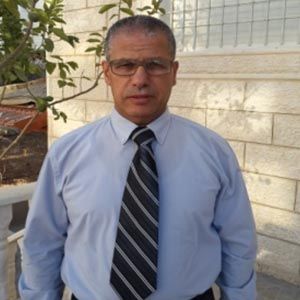
Dr. Ibrahim Alghrouz, Associate Professor of Complex Anaylsis and Head of Department of Mathemtics, Al-Quds University, graduated from University of New York al Albany in 1992 with a doctorate degree and a master’s degree in Abstract Algebra from Yarmouk University – Jordan. He received research fellowship from the German Academic Exchange association (DAAD). He also served in several acadmic issues at Al-Quds University and as a dean of admission and registration. Research interests include work in Complex anaylsis and Fractional Dervatives. The following include selected and most recent scientific publications:
1) S.T. Syouri, M. Alghrouz “ Conformable Fractional Differential Transform Method for Solving Fractional Derivatives” , International Journal of Advanced Science and Technology, Vol. 29, No. 07, (2020), pp. 1734-1743.
2) S.T. Syouri, M. Alghrouz “A Modified Differential Transform Method for Solving Nonlinear Systems”, International Journal of Advanced Science and Technology, Vol. 29, No. 05, (2020), pp. 240-247.
3) S.T. Syouri, M. Alghrouz “Conformable Fractional Differintegral Method for Solving Fractional Equations”, International Journal of Scientific & Technology Research Vol. 9, ISSUE 03, March 2020.
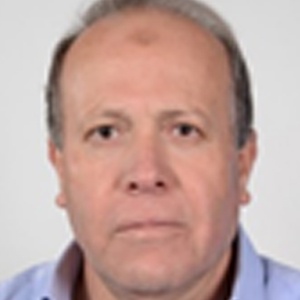
Teaching philosophy:
After 26 years (1994 – 2021) of teaching and supervising graduate and undergraduate students and working very hard to be an excellent lecturer, I have decided to move from being lecturer to be a MOTIVATOR. Currently, I do not believe in the learning efficiency of lecture room teaching. The real learning happens in the research lab, in the library, or in the course of community work. Learning by doing, trial and error are the mottos of successful education. I have to teach skills and knowledge. The best education is through real projects. Therefore, my role as a Motivator is to motivate students to go to the lab, to do research lab, to go to the library, to communicate with the community, to explain physics for non-science students, to enhance the physics literacy of the university students and of the community. In addition, I am determined to fulfill the levels of knowledge (knowledge, comprehension, application, analysis, synthesis, and evaluation) among the students. Always, I am doing my best to convey knowledge in the sense of wisdom, paired with ethics and responsibility.
On-going research:
(I) Currently, I am working on developing my Monte Carlo code (Barghouthi model) in order to investigate the effects of altitude and velocity dependent wave – particle interactions by using our recent findings (Nilsson et al., 2012 a, b, see publications list). We will use this updated model to study the ion outflows in the polar wind and auroral regions. In addition, a comparison between the results of this Monte Carlo code and the results of other models is under investigation.
(II) It is a very challenge project, the project of investigating the double-hump distributions in the solar wind. The Puzzle of fast solar wind (i.e., Helium ions are faster than Hydrogen ions in the solar wind) still unsolved issue, because heavier ions are expected to move slower than lighter ions in the solar wind. I am planning to build up a Monte Carlo code to investigate the physics of the solar wind. In specific, I am interested to study the effects of Coulomb collisions and wave – particle interactions on the H+ ions outflow in the solar wind. I have the potential to do that because there are many similarities between the physics of the polar wind (my expertise area) and the solar wind. Because of this research, I will be able to explain (theoretically) the observed H+ double-hump distributions in the solar wind and provide an explanation to the fast solar wind.
(III) Also, I am planning to modify my Monte Carlo code for the behavior
of O+ ions in the ionosphere by including the effects of NO+ molecular ions and other molecular ions. Knowing the exact behavior of O+ ions in the ionosphere is very important to the community of space communications.
Publications (Total 57 ): I have been involved in 2 lines of research:
Line 1: The field of theoretical space plasma physics, 42 papers in leading journals.
Line 2: The interdisciplinary fields of scientific literacy, education, and Islam and science, 15 publications in local and regional journals.
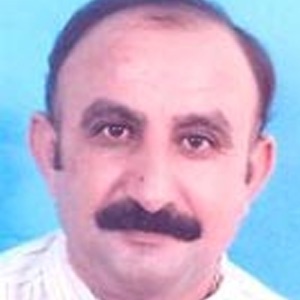
Teaching Experience:
Dr Jamil Jamal taught the courses Calculus, linear algebra , abstract
algebra, real analysis, complex analysis , functional analysis ,
topology, number theory, statistics, differential equations, set theory
general mathematics , applied mathematics .
Academic History :
Dr Jamil Jamal Abu Ismail is an Assistant Professor in the Math. Department in the Faculty of Science and Technology . He is working in this College since 1987, where he worked for more than thirty four years as a lecturer at Al-Quds University in the Mathematics Department for both bachelors and masters of all levels and supervisors some of theses in mathematics. Also Dr. Jamil Abu Ismail was a chairman for the Department for Mathematician in the years 2007/2008 , 2008/2009 , 2019/2020 , and 2020/2021 up to now.
Dr. Jamil Abu Ismail shared in the development of courses in mathematics and study plans for both Bachelor and master.
Dr. Jamil Abu Ismail obtained the PhD degree in the Mathematics in 2006 from the University of Jordan , he obtained the master’s degree of mathematics in mathematical analysis in 1987 from the Yarmouk University in Jordan, and he obtained the Bachelor’s degree obtained in 1985 from the Yarmouk University in Jordan.
Dr. Jamil Abu Ismail interests focus on real analysis ,functional analysis ,topology , and number theory.
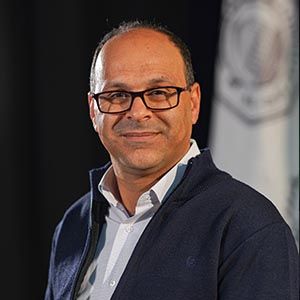
Teaching Experience:
Introduction to Environmental studies, Wastewater technology, water and treated water quality, Soil science .
Office Hours: Sunday, Tuesday, Wednesday : 10-11 am and 13 – 14 pm
Academic History and experience
Dr. Jawad Hasan Shoqeir is the director of Soil & Hydrology Research (http://www.alquds.edu/en/soil-hydrology-laboratory.html), working at the Department of Earth and Environmental Sciences, Al-Quds University, Palestine. Dr. Shoqeir interests are focused in the field of integrated resources management (IRM), groundwater quality, watershed hydrology. He has worked extensively on soils and water quality issues as well as he is enrolled in ILTER (https://deims.org/85b2c11a-8d09-4582-8048-195f3519c41c). He has worked extensively on Wadi Nar/Kidron master plan and Yarqon/Auja master plan where water management issue is a main conflict issue between riparians. Dr. Shoqeir teaching several courses for graduates and postgraduates about water resources management and cross conflict issues among riparian countries. Dr. Shoqeir projects are related to understanding and estimating water quality, water budget in the Dead Sea Basin, he is interested in the impact of wastewater mixing with the available freshwater.
Dr. Jawad Shoqeir has published many manuscripts in international journals, including:
• Alsamamra, H., Shoqeir, J. and Zeade., F.,(2021) Indirect Impact of Segregation Wall on the Investment in Renewable Energy in Palestine. European Journal of Sustainable Development (2021), 10, 2, 159-170 ISSN: 2239-5938 Doi: 10.14207/ejsd.2021.v10n2p159, https://doi.org/10.4000/poldev.2002
• Alsamamra, H., Isaila, I. and Shoqeir, J. (2021) Promoting Energy Efficiency in the Palestinian Mu- nicipalities: A Case Study of Al-Dahriya Municipality. Smart Grid and Renewable Energy, 12, 17-29. https://doi.org/10.4236/sgre.2021.122002
• Husain Alsamamra, Jawad Shoqeir, Solar Photovoltaic Systems on Public Schools Buildings: A Case Study in Palestine, American Journal of Electrical Power and Energy Systems. Vol. 10, No. 1, 2021, pp. 1-5. doi: 10.11648/j.epes.20211001.11
• Alsamamra, H.R. and Shoqeir, J.A.H (2020) Assessment of Wind Power Potential at Eastern-Jerusalem, Palestine Open Journal of Energy Efficiency, 9, 131-149. https://doi.org/10.4236/ojee.2020.94009
• Khalaf, S.; Shoqeir, J.H.; Lelario, F.; Bufo, S.A.; Karaman, R.; Scrano, L. TiO2 and Active Coated Glass Photodegradation of Ibuprofen. Catalysts 2020, 10, 560. DOI
https://doi.org/10.3390/catal10050560 Received: 29 January 2020 / Revised: 22 February 2020 / Accepted: 25 February 2020 / Published: 18 May 2020
• Shoqeir J. (2019) Assessment of Vulnerability and Risk Mapping at Marsaba—Feshcha Catchment. In: Chaminé H., Barbieri M., Kisi O., Chen M., Merkel B. (eds) Advances in Sustainable and Environmental Hydrology, Hydrogeology, Hydrochemistry and Water Resources. Advances in Science, Technology & Innovation (IEREK Interdisciplinary Series for Sustainable Development). Springer, Cham, pp 271-275, ISBN978-3-030-01572-5. DOI https://doi.org/10.1007/978-3-030-01572-5_65.
• Khalaf, S., Shoqeir, J.H., Scrano, L., Karaman, R., Bufo, S.A. and Kurniawan, T.A. (2019) Removal of Herbicides from Water Using Heterogeneous Photocatalysis Case Study: MCPA Sodium Monohydrate. Journal of Water Resource and Protection, 11, 1024-1035.https: //doi.org/10.4236/jwarp.2019.118060
• J. H. Shoqeir, H. Fataftah, J. van de Vossenberg, P. van der Steen and S. Khalaf (2018) Performance of Anaerobic Baffled Reactor/Gravel Bed Filter Towards Domestic Wastewater Treatment”. EC Agriculture 4.2 (2018): 153-158. ECAG-04-00105.pdf (569.5Kb)
• Khalaf, S., Shoqeir, J.H., Scrano, L. et al. Environ Sci Pollut Res (2018). Photodegradation using TiO2-activated borosilicate tubes Environmental Science and Pollution Research https://doi.org/10.1007/s11356-018-2858-5. ISSN1614-7499 (https://rdcu.be/4Cai)
• Khalaf, S., Shoqeir, J.H., Scrano, L., Karaman, R., Sabino A. Bufo (2018) Photodegradation using TiO2-activated borosilicate tubes. Environmental Science and Pollution Research, ISSN 0944-1344 https://doi.org/10.1007/s11356-018-2858-5.
• Ahlborn, M., Armon, M., Ben Dor, Y., Neugebauer, I., Schwab, M., Tjallingii, R., Shoqeir, J.H., Brauer, A. (2018). Increased frequency of torrential rainstorms during a regional late Holocene eastern Mediterranean drought. Quaternary Research, 89(2), 425-431. doi:10.1017/qua.2018.9.
• Djukic, I., et al., Early stage litter decomposition across biomes, Sci Total Environ (2018), https://doi.org/10.1016/ j.scitotenv. 2018.01.012
• Matano, A., Van der Steen, P., Hasan Shoqeir, J., and Alfonso, L., (2018) Framework to Identify Optimal Configurations of (De)Centralised Wastewater Systems, in Abu Dis, West Bank, 13th International Conference on Hydroinformatics, vol 3, pages 1350–1357https://easychair.org/publications/paper/H2pD, https://doi.org/10.29007/lnhb
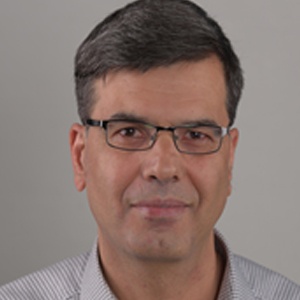
Prof. Dr. Abbadi is a professor in plant nutrition since 2019, holding a Ph. D. in agriculture. He got his first and second degrees from Al-Quds University, Jerusalem-Palestine (B.Sc. in Biology and medical technology in 1995 and M.Sc. in Applied industrial technology in 2002) and the Ph.D. degree in agricultural science in 2007 from Christian-Albrecht’s University, Kiel, Germany. He is currently a staff teaching member in the Department of Biology, College of Science and Technology at Al-Quds University since 2008. He teaches, General biology, plant physiology, plant biochemistry, ecology, plant production, and plant nutrition.
His Research interests are in different related agricultural fields in which forty papers are already published. His main research interest is characterizing nutrient use efficiency of plants emphasizing the mechanisms of nitrogen, phosphorous, and potassium uptake and utilization efficiency parameters including plant and soil parameters. Other research interests are: anti-oxidant contents and their activities of medicinal plants and fruits, factors affecting olive oil quality, application of plant growth promoting bacteria, wastewater treatment and reuse in agriculture, effect of salinity on fruit quality and. He is interested now in improving water use efficiency of plants by optimizing K nutrition. He published 40 publications in international journals.
مشاريع أبحاث مدعومة
• Sanitary and phytosanitary (SPS) and food safety post graduate master’s program At Al-Quds University, funded by Food and Agriculture Organization. Project director. Project fund 94500 Euro, 2015-2018.
• Strengthening capacity for sustainable innovation processes, including market responsiveness of higher education & training to the needs of the Food & Agribusiness and Rural Development sectors in the Palestinian Territories’, funded by NUFFIC, with the project reference NICHE-PAA-233. The beneficiary organizations are Al-Quds University, An-Najah National University, Palestine Technical University/Khadoorie, and Hebron University. Project manager. Project fund 2200000 Euro, 2015-2020.
• Conducting applied agricultural researches within the research priorities of the National Agricultural Research Centre (NARC)/Ministry of Agriculture, funded by Food and Agriculture Organization. Project director. Project fund 54000 Euro. 2018-2019.
• Green jobs and Sustainable Income Opportunities for Palestinian Female and Male Youth in the Agri-food Sector, funded by Danish government and executed by FAO, coordinator and trainer at Al Quds University, project fund for AQU 300000 US$, 2020-2021.
• Vocational Training Project: Socio-Economic Agricultural Skills. Prof. Dr. Jehad Abbadi, Al-Quds University, Jerusalem (Team leader), Dr. Muhammad Mushtaha (UCAS) Gaza, Dr. Heba Al-Fares An-Najah National University, Dr. Murad Awadallah, Palestine Technical University- Khadoori, PTUK.
منشورات مختارة
• Bianca Hamaoui, Jihad M. Abbadi, Saul Burdman, Adnan Rashid, Shlomo Sarig and Yaacov Okon, (2001): Effects of inoculation with Azospirillum brasilense on chickpeas (Cicer arietinum) and faba beans (Vicia faba) under different growth conditions, Agronomie 21, 553-560.
• M. Khamis, J. Abbadi, B. Sattelmacher, J. Gerendás and U. Kafkafi (2002): Influence of N form (NO3− vs. NH4+) and salinity on tomato yield and fruit composition, In Horst, W. J. et al., (Eds.) Plant Nutrition, Food security and sustainability of agro-ecosystems through basic and applied research, Kluwer Academic Publisher, Dordrecht; The Netherlands, Vol. 92, pp 306-307.
• Jehad Abbadi, J. Gerendás, and B. Sattelmacher (2005): Effects of N, P and K Supply on Growth and Yield of Safflower (Carthamus tinctorius L.) Compared to Sunflower (Helianthus annuus L.) under Greenhouse Conditions. In Esendal, E. et al., (Ed.): VIth International Safflower Conference, 6-10 June, Istanbul-Turkey, pp 335-343.
• Jehad Abbadi (2007): Importance of nutrient supply (N, P, K) for yield formation and nutrient use efficiency of safflower (Carthamus tinctorius L.) compared to sunflower (Helianthus annuus L.) including an assessment to grow safflower under north German conditions. Grauer Publisher, Beuren Stuttgart – Germany. ISBN: 3861865440, 9783861865445.
• Jehad Abbadi, Jóska Gerendás, and Burkhard Sattelmacher (2008): Effects of Nitrogen Supply on Growth, Yield and Yield Components of Safflower and Sunflower, Plant and Soil, 306, pp: 167-180.
• Jehad Abbadi, Jóska Gerendás, and Burkhard Sattelmacher (2008): Effects of Potassium Supply on Growth and Yield of Safflower as compared to Sunflower, Journal of Plant Nutrition and Soil Science, 171, 272-280.
• Jóska Gerendás, Jehad Abbadi, and Burkhard Sattelmacher (2008): Potassium Efficiency of Safflower (Carthamus tinctorius L.) and Sunflower (Helianthus annuus L.). Journal of Plant Nutrition and Soil Science, 171, 1-9.
• Jehad Abbadi and Jóska Gerendás (2009): Nitrogen Use Efficiency of Safflower as compared to Sunflower. Journal of Plant Nutrition 32:6, 929 – 945
• J Hagin, M Khamis, A Manassra, J Abbadi, M Qurie, A Bulad, L Al Hadidi, R Semiat, A Shaviv, I Katz, C Dosoretz, O Blonder (2010): Treatment and Use of Wastewater for Agricultural Irrigation. International Fertilizer Society-Proceeding 680. ISBN 978-0-85310-317-2.
• Jehad Abbadi and Jóska Gerendás (2011): Effects of Phosphorous Supply on Growth and Yield of Safflower as compared to Sunflower. Journal of Plant Nutrition 34:12, 1769-1787
• K. Abu-Alruz, I. A. Afaneh, J. M. Quasen, M. A. Hmidat, J. Abbady, A. S. Mazahreh (2011): Factors Affecting D-7-Stigmastinol in Palestinian Olive Oil. Journal of Applied Sciences 11 (5): 797-805.
• Ibrahim Afaneh, Ahmad Sundookah, Khaled Abu-Alruz, Jehad Abbadi, Jihad M. Quasem, Suleiman Alloussi and Ziad Ayyad (2011): Fundamental Elements to Produce Sesame Yoghurt from Sesame Milk. American Journal of Applied Sciences 8 (11): 1086-1092.
• Ibrahim Afaneh, Khalid Abu-Alruz, Jihad M. Quasem, Ahmad Sundookah, Jehad Abbadi, Suleiman Allousi, and Saleh Sawalha (2011): Effect of Critical Processing Variables on Sesame Milk Quality. American Journal of Agricultural and Biological Sciences 6(11): 517-520. DOI: 10.3844/ajabssp.2011.517.520
• Rafik Karaman, Mustafa Khamis, Mohannad Qurie, Rawan Halabieh, Iman Makharzeh, Adnan Manassra, Jehad Abbadi, Alaa Qtait, Sabino Bufo, Ahmed Nasser, Shlomo Nir (2012): Removal of Diclofenac Potassium from Wastewater Using Clay-Micelle Complex. Environmental Technology 33 (11) pp: 1279-1287 DOI: 10.1080/09593330.2011.619582, 1–9
• Mustafa Khamis, Rafik Karaman, Mohannad Qurie, Jehad Abbadi, Sameh Nusseibeh, Adnan Mannassra, Shlomo Nir (2012): Performance of micelle-clay filters for removing pollutants and bacteria from tertiary treated wastewater. Journal of Environmental Science and Engineering B 1 (2), 160-168
• Jehad Abbadi, Rinad Saleh, Sameh Nusseibeh, Muhannad Qurie, Mustafa Khamis, Rafik Karaman, Laura Scrano and Sabino Aurelio Bufo (2012): Microbial removal from secondary treated wastewater using a hybrid system of ultrafiltration and reverse osmosis. Journal of Environmental Science and Engineering A 1 (7), 853-869
• Jehad Abbadi and Jóska Gerendás (2012): Phosphorous use efficiency of Safflower and Sunflower studied in nutrient solutions. Journal of Agricultural Science and Technology A 2 , 1260-1280
• Jehad Abbadi and Jóska Gerendás (2012): Potential for Safflower cultivation under temperate conditions. Journal of Agricultural Science and Technology A 2 (2012) 1307-1321
• Ibrahim Abdullah Afaneh, Jehad Abbadi, Ziad Ayyad, Wadee Sultan and Khalid Kanan (2013): Evaluation of selected quality indicators of extra virgin olive oil bottled in different packaging materials upon storage under different lighting conditions. Journal of Food Science and Engineering 3, 267-283
• Mohannad Qurie, Jehad Abbadi, Laura Scrano, Sabino Bufo, Mustafa Khamis, Rafik Karaman (2013): Inland Treatment of the Brine Generated from Reverse Osmosis Advanced Membrane Wastewater Treatment Plant using Epuvalisation System. International Journal of Molecular Science 14 (7):13808-25.
• Muhannad Qurie, Mustafa Khamis, Fida Malek, Shlomo Nir, Sabino A. Bufo, Jihad Abbadi, Laura Scrano, and Rafik Karam (2013): Stability and removal of naproxen and its metabolite by advanced membrane wastewater treatment plant and micelle-clay complex. CLEAN – Soil, Air, Water 41:1-7. DOI:10.1002/clen.201300179
• Odeh, I., Al-Rimawi, F., Abbadi, J., Obeyat, L., Qabbajeh, M., Hroub, A. (2014): Antioxidant activity, phenolic content, and flavonoid content of various date palm (Phoenix dactylifera) fruits from Palestine, Journal of Food Science 2 (8): 499-505
• Jehad Abbadi1, Ibrahim Afaneh, Ziad Ayyad, Fuad Al-Rimawi, Wadie Sultan, Khalid Kanaan (2014): Evaluation of selected quality indicators of extra virgin olive oil bottled in different packaging materials stored under different temperature. American Journal of Food Science and Technology, 2, No. 5, 162-174, DOI:10.12691/ajfst-2-5-5.
• Fuad Al-Rimawi, Imad Odeh, Abdallah Bisher, Jehad Abbadi, Mohammad Qabbajeh (2014): Effect of geographical region and harvesting date on antioxidant activity, phenolic and flavonoid content of olive leaves, J. food and Nutrition Research, 12 (2014): 925-930. doi: 10.12691/jfnr-2-12-11.
• Jehad Abbadi and Jóska Gerendás (2015): Phosphorous use efficiency of Safflower as compared to Sunflower. Journal of Plant Nutrition Volume 38, Issue 7 pp. 1121-1142. DOI: 10.1080/01904167.2014.983115
• Fuad Al-Rimawi, Jihad Abadi and Ibraheem Afaneh: (2016) Development and Validation of a Reversed-Phase HPLC Method for Determination of Elaidic Acid in Oils and Fats, British Journal of Applied Science & Technology 12(6), Article no.BJAST.19762 ISSN: 2231-0843, NLM ID: 101664541.
• Rafik Karaman, Mustafa Khamis, Jehad Abbadi, Ahmad Amro, Mohannad Qurie, Ibrahim Ayyad, Fatima Ayyash, Omar Hamarsheh, Reem Yaqmour, Shlomo Nir, Sabino A. Bufo, Laura Scrano, Sofia Lerman, Shirra Gur-Reznik & Carlos G. Dosoretz (2016): Paracetamol biodegradation by activated sludge and photo-catalysis and its removal by a micelleclay complex, activated charcoal and reverse osmosis membranes. Environmental Technology 37(19); 2414-2427, http://www.tandfonline.com/loi/tent20
• Khalid Qabaha, Jehad Abbadi, Fuad Al-Rimawi (2016): Anti-inflammatory of Eucalyptus spp. and Pistascia lentiscus leaf Extracts. African Journal of Traditional, Complementary and Alternative medicines (AJTCAM), (2016) 13(5), 1-6.
• Fuad Al-Rimawi, Jehad Abbadi, Saleh Abu Lafi, Imad Odeh, ayman Amarneh, Raneen Sawahreh (2017) Analysis of Phenolic and flavonoids of wild Ephedra alata plant extracts by LC/PDA and LC/MS and their antioxidant activity. African Journal of Traditional Complimentary and Alternative Medicines 14 (2):130-141. doi:10.21010/ajtcam.v14i2.14
• Jehad Abbadi (2017): Phosphorous use efficiency of safflower and sunflower grown in different soils. World Journal of Agricultural Research. Vol. 5, No. 4, 212-220
• Jehad Abbadi, Klaus Dittert, Bernd Steingrobe, and Norbert Claassen (2017) “Mechanisms of Phosphorous Uptake Efficiency of Safflower and Sunflower Grown in Different Soils.” Research in Plant Sciences, vol. 5, no. 1, 26-42. doi: 10.12691/plant-5-1-4.
• Jehad Abbadi (2017), “Potassium Use Efficiency of Safflower and Sunflower Grown in Different Soils.” World Journal of Agricultural Research, vol. 5, no. 5 (2017): 244-257. doi: 10.12691/wjar-5-5-1.
• Jehad Abbadi, “Evaluation of Mechanisms of Phosphorus Use Efficiency in Traditional Wheat Cultivars for Sustainable Cropping. Journal of Food Security, vol. 5, no. 6 (2017): 197-211. doi: 10.12691/jfs-5-6-1.
• Ibrahim Afaneh, Jehad Abbadi*, Fuad Al-Rimawi, Ghassan Al-Dabbas, and Saleh Sawalha, “Effect of Frying Temperature and Duration on the Formation of Trans Fatty Acids in Selected Fats and Oils.” American Journal of Food Science and Technology, vol. 5, no. 6 (2017): 245-248. doi: 10.12691/ajfst-5-6-4. Pub. Date: November 14, 2017
• Qabaha K., Al-Rimawi F., Nusseibeh S., Abbadi J., Abu-Lafi S., 2019, Phenolic and flavonoids analysis of pomegranate peel extracts and their antiniflammatory and antioxidant activities, International Journal of pharmacognosy and phytochemical research 10(1); 60-65.
• Jehad Abbadi, Klaus Dittert, Bernd Steingrobe & Norbert Claassen (2019): Mechanisms of potassium uptake efficiency and dynamics in the rhizosphere of safflower and sunflower in different soils, Journal of Plant Nutrition, DOI: 10.1080/01904167.2019.1655035
• Saleh Abu-Lafi, Fuad Al-Rimawi, Jehad Abbadi, Saleh. A. Naser and Khaled Qabaha (2020): Separation and identification of phenolics and flavonoids from wild Pistacia palaestina extract and its antioxidant activity. Journal of Medicinal Plants Research 14(7), pp. 317-325. DOI: 10.5897/JMPR2020.6969
• Fuad Al-Rimawi, Shawqi Harahsheh, Odeh I., Abbadi J., Saleh Abu-Lafi (2018): Phenolic and flavonoids analysis of wild Zizphus spina-christi leaves extracts and their antioxidant activities, African Journal of Traditional Complementary Alternative Medcine, submitted.
• Mohammad Dawabsheh, Jehad Abbadi, Fuad Al- Rimawi, Thameen Hijawi, Rafik Karaman (2020): Evaluation of Local Safflower Landraces for Oil Production under Mediterranean Climatic Conditions in Palestine. Case Studies Journal 9(9), ISSN (2305-509X).
• Khaled Qabaha, Thameen Hijawi, Abdallah mahamid, Haneen Mansour, Ahmad Naeem, Jehad Abbadi, and Fuad Al-Rimawi (2021): Anti-inflammatory and antioxidant activities of Teucrium polium leaf Extract and its phenolic and flavonoids content. Asian Journal of Chemistry, ISSN 0970-7077. Vol. 33, No. 4 (2021), 881-884
الأبحاث الجارية حاليا
• دراسة آلية امتصاص البوتاسيوم والفسفور واختلافها بين النباتات المختلفة في أصناف تربة مختلفة
• دراسة تحسين كفاءة النباتات في استخدام الماء بواسطة التغذية في البوتاسيوم
• دراسة تأثير المنطقة الجغرافية والمناخية في فلسطين على محتوى زيت الزيتون وأوراق الزيتون من مضادات الأكسدة
• دراسة محتوى وكفاءة مضادات الأكسدة في التمور التالفة من مصانع تعبئة التمور لاستخدامها كمواد حافظة في الأغذية
• دراسة محتوى النباتات الطبية الفلسطينية من مضادات الأكسدة ودراسة فعالية هذه المواد الفعالة ضد الالتهاب والبكتيريا
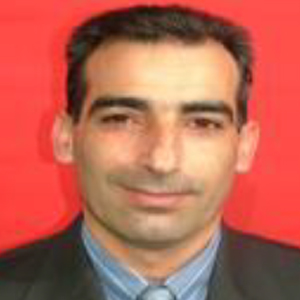
Dr. Khalid Salah is assistant professor of applied statistics at the Faculty of Science. He joined the faculty
in 2002. He worked for more than ten years as a teacher of mathematics and computer science at YMCA
schools. Dr. Khalid headed the university’s Statistical and study unit from 2010 to 2016. He worked on
many statistical issues, most notably university statistics, organizing the statistical process between the
university and the Palestinian Ministry of Higher Education and the Palestinian Central Bureau of
Statistics. Dr. Khalid is currently working on the development of teaching statistics and biostatistics at the
university to keep pace with the scientific and technological progress in the world. He also contributed to
the development of many courses of statistics and biostatistics at the bachelor and master level, which he
teaches some of these courses.
Dr. Khalid is currently working in cooperation with the Department of Mathematics and the Deanship of
the Faculty of Science, and with a direct assignment from the university president, to establish the
“Jerusalem Center for Statistics”, which in turn will contribute and assist in most of the statistical work of
the university, staff, as well as students, especially graduate students.
It is worth mentioning that Dr. Khalid has been chosen as a referee for many international scientific
journal because of his research achievements in the fields of Applied Statistics, Biostatistics, and Applied
Mathematics including:
- An Approximation of A longitudinal Stochastic Model, International Journal of Clinical
Biostatistics and Biometrics, 5(1), (2019), ISSN: 2469-5831. - On Maximum Likelihood Estimation of Mixed Cure Fraction Model Assuming Stable Distribution,
International Journal of Tomography and Simulation, 34(2), (2021), ISSN: 2319-3336. - Error Analysis For The Finite Element Approximation of Conductive-Radiative Model, European
Journal of Scientific Research, Volume 11, No 2 November, 2005, 236-245 - A Semiparametric Joint Model for Longitudinal and Time-to-Event Univariate Data in Presence of
Cure Fraction, European Journal of Scientific Research ISSN 1450-216X Vol.18 No.4 (2007),
pp.707-729 © EuroJournals Publishing, Inc. 2007 - Cure Fraction, Modelling and Estimating in a Population-Based Cancer Survival Analysis,
Malaysian Journal of Mathematical Sciences 2 (1): 113-134 (2008) - Bayesian Approach for Joint Longitudinal and Time-to-Event Data with Survival Fraction,
BULLETIN of the Malaysian Mathematical Sciences Society (2) 32(1) (2009), 75–100. - A Stochastic Joint Model for Longitudinal and survival Data with Cure Patients, International
Journal of Tomography & Statistics, Winter 2009, Vol. 11, No. W09.; 48-67; ISSN 0972-9976 (
Print ); ISSN 0973-7294 (Online). - An Approximation of A longitudinal Stochastic Model, International Journal of Clinical
Biostatistics and Biometrics (2018), Revising
This was in addition to participating in many scientific conferences inside and outside the country.
The most recent was the scientific conference on mathematics and applied statistics, which was held at Birzeit
University, Ramallah, From 27-30 August 2018.
Dr. Khalid holds a PhD in applied statistics, which he received in 2007 from Putra University in
Malaysia, an MA in Applied Mathematics (2002) from Al Quds University, and a Bachelor’s Degree
(1989) from College of Science and Technology / Abu Dies.
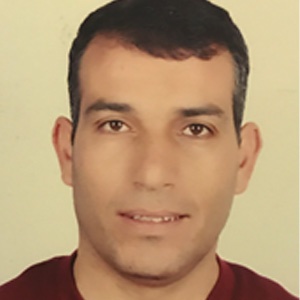
Dr. Alkhatib is an assistant professor of physical chemistry. He received his bachelor’s degree in Chemistry and Chemical Technology from Al-Quds University in 1996. From that date he worked in Chemistry Department as teacher assistant in addition to supervising the university’s laboratories. He obtained master degree in organic chemistry from Al-Quds University in 2001. Since then, he worked as teacher for practical courses in Chemistry Department until 2013. Dr. Alkhatib held Ph.D. in physical chemistry in 2016from Christian-Albrechts University of Kiel, Germany. Since 2018 he has been the chairman of Chemistry Department at Al-Quds University.
Dr. Alkhatib developed practical chemistry and physical chemistry courses, who currently teaches. He is member many committees at the university. Awarded the highest impact factor for his research publications at Al Quds University for the academic year 2017/208. He also was provided a financial support for research by the Ministry of Higher Education.
The area of research interest is the change of isotope composition of elements as function of thermodynamic and kinetic factors affecting the chemical reactions in addition to the synthesis of novel organic compounds.
Dr. Alkhatib has published many manuscripts in international journals, including:
1- M. Alkhatib and A. Eisenhauer: Calcium and strontium isotope fractionation during precipitation from aqueous solutions as a function of temperature and reaction rate; II. Aragonite. GeochimicaetCosmochimicaActa, 209 (2017) 320-342.
2- M. Alkhatib and A. Eisenhauer: Calcium and strontium isotope fractionation in aqueous solution as function of temperature and reaction rate; I. Calcite. GeochimicaetCosmochimicaActa, 209 (2017) 296–319.
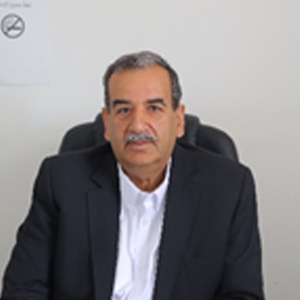
Dr. Mohammad Abul Haj is an Associate Professor of Inorganic Chemistry and Crystal Engineering. Holding a PhD degree in Coordination Chemistry from Granada University In the year 2000. PhD thesis was supervised by Prof. Juan Manuel Salas and Prof. Miguel Quiros. Dr. Mohammad had finished his B.Sc. degree from Bier-Zeit University in 1987. He worked at Al-Quds University at the department of Medical Technology.
Dr. Mohammad Abul Haj research is in field of Coordination Chemistry, in particular coordination compounds of Platinum group metals, investigation their synthesis, Characterization and biological activity. In addition, he experienced synthesis of coordination compounds with other metals (Cu, Ni, Co, Fe) investigating their characterization and physical applications. Dr. Mohammad is experienced in the coordination compounds of silver, he investigated synthesis Characterization, Crystal structure and application.
In 2011 he was awarded Fulbright visiting Professor Grant at Kansas State University, where he worked with Distinguished Professor Christer B. Aakeröy. He worked in research in the field of Crystal Engineering and Supramolecular Chemistry. After that he started new line of research in this field at Al-Quds University. During 2014-2018 he was the head of the Chemistry and Chemical Technology Department and Coordinator of the Applied Industrial Technology Graduate program till he was appointed Dean of the Faculty of Science and Technology.
Contact information: Dean of Science and Technology, P.O. Box 20002, Al-Quds University, Abu Dies, Jerusalem, Palestine: 02-27996961
Selected Publications
M. Abul Haj, M. Quiros, J.M.Salas R. Faure; Structure of a tetranuclear heterometallic Ag(I)-Pt(II) complex with a triazolopyrimidine derivative; Inorganic Chemistry Communication, 4, (2001) 254-256
M. Abul Haj, M. Quiros, J.M.Salas, R. Faure; Silver complexes with triazolopyrimidine ligands containing an exocyclic oxygen atom: X-ray evidence for an unusual tautomeric form; Dalton transaction, 2001,1798-1801.
M. Abul Haj, M. Quiros, J.M.Salas; Structurally different copper(II) dinuclear complexes with the same triazolopyrimidine bridging ligand; European Journal of Inorganic Chemistry, 2002, 811-818.
M. Abul Haj, M. Quiros, J.M.Salas; Solution and solid state coexistence of head-head and head-tail isomers in dimeric Pd(II) and Pt(II) complexes of the type [M2(a-a)(L-N3N4) a bridging triazolopyrimidine ligand and chelating bidentate diamines; Journal Chem Soc., Dalton trans. 2002,4740-4745.
Mohammad Abul Haj, Christer B. Aakeroy and John Desper; Silver(I) coordination chemistry: from 1-D chains to molecular Rectangles; New Journal of Chemistry, 2013,37, 204-211.
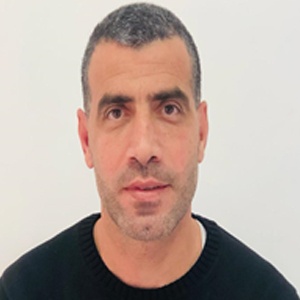
Dr. Qurie is an assistant professor of Environmental Chemistry and Science. He received his bachelor’s degree in Chemistry and Chemical Technology from Al-Quds University in 1997. He working as lab Technician in Center for chemical and biological analysis. He obtained master degree in applied industrial technology from Al-Quds University in 2002. Dr. Qurie held Ph.D in Environmental chemistry and science in 2014 from Basilicata University, Italy. Since 2010 he has an academic member of Faculty of science and technology also since 2013 he has been the Director of Center for chemical and biological analysis until 2019.
The area of research interest is the removal of organic pollutant from polluted water as pharmaceutical compounds, and pesticides in addition to heavy metal removal using adsorption and advance oxidation process. Reuse of treated wastewater in agriculture and application of hydroponic systems in water purification, THMs potential formation in swimming pools and Improvement of olive oil quality using antioxidant natural products.
Dr. Qurie has published many manuscripts in international journals, including:
1. Amer Kanan · Mohannad Qurie · Loay awad · Lamis Qdemat. (2019) Seasonal and Spatial Effects on Total Trihalomethane Formation Potential in Groundwater in Tulkarm and Hebron, Palestine”, Euro. Euro-Mediterr J Environ Integr (4), 41.doi:10.1007/s41207-019-0134-9
2. Mohannad Qurie, Sabreen Daghra, Mustafa Khamis , Amer Kanan , Zaher Barghouthi , Abdallah Alimari , and Rafik Karaman . (2019). Application of the Epuvlization Technology for the Tertiary Treatment of Secondary Treated effluents using Geranium Plants. Annals of Agricultural Science AOAS. https://doi.org/10.1016/j.aoas.2019.12.007. 64(2), pp. 237-243.
3. Ziad Ayyad. MohannadQurie, Amal Natshe, Saleh Sawalha and Fuad Alrimawi. (2020).Enhance the stability of traditional concentrayted Yoghurt using natural antioxidants additives.Oriental Journal of chemistry.36:(5) 879-888.[/vc_column_text][/vc_column][/vc_row]
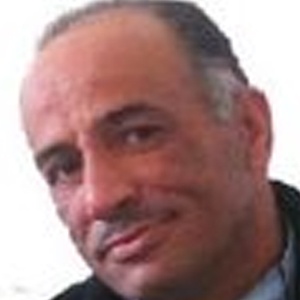
General Physics, General Physics Labs , Electricity and Magnetism ,Mathematical Physics , Modern Physics ,Properties of Matter ,Advance Laboratories, Solid State Physics, Medical Physics, Thermodynamics, Introduction to Ceramic science, Advance Solid State Physics, Spectroscopy.
Office Hours: Sunday, Tuesday, Wednesday : 10-11
Academic History and experience
Prof. Musa Abu Teir is a professor of solid state physics at college of science and technology. He joined the faculty of science and technology a year 1985. Recently, he is the physics head department at college of science and technology in the addition of a member in different committees at the college. Prof. Abu Teir participates in the development of Bachelor and Master program plan studies at physics department, beside he renew the advance physics lab experiments and directed of the renewable general and advance lab experiments manual.
Prof. Abu Teir has been published so many scientific research articles in scientific journals of high impact factor, already published around 35 scientific articles and supervision for master thesis of about 10 master thesis.
Prof. Abu Teir got his Ph.D. degree of solid state physics on 2003 from Hebrew University in Jerusalem, Israel, his master degree of thermodynamics on 1990 from South Dakota School of Mines & Technology, USA, and his Bachelor degree on 1985 from Al-Quds University, Palestine.
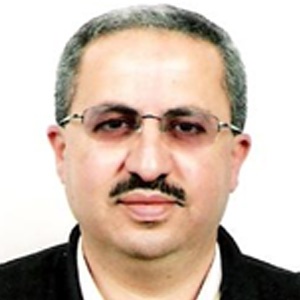
Mutaz Akkawi currently is an Professor of Biochemistry at the Department of Life Sciences of Al-Quds University.
He is the Director of the Biochemical laboratory and completed his education at Birzeit University, West Bank and at The Hebrew University of Jerusalem, Jerusalem. He is a member of the Medical Screening Society, London, UK.
His research interests include: Screening for a new potential antimalarial drugs using newly developed in vitro methods; building synthetic models for the formation of malarial pigment and; developing biophysical methods for the study of membrane proteins. He is interested in using the FTIR techniques in probing membrane protein secondary structure.
akkawi74@gmail.com, makkawi@staff.alquds.edu
Teaching Experience:
Biochemistry I, II
Advanced Biochemistry
Structure and function of protein and enzyme
Clinical chemistry I,II
Endocrinology
Scientific measuring devices
Research interests :
1. Screening for a new potential antimalarial drugs using newly
developed in Vitro methods.
2. Building synthetic models for the formation of malarial pigment.
3. Developing biophysical methods for the study of membrane proteins.
We are interested in using the FTIR techniques in probing membrane
protein secondary structure.
4. Screening the serum of pregnant Palestinian women of some genetic
diseases like Down’s syndrome
5.Investigation of Total antioxidant status in Palestinian diabetic
patients
Latest Publications
1- Abu-Lafi S., Akkawi M., Abu-Remeleh Q., Qutob M., Lutgen P.
Curcumin, a natural isolate from Curcuma longa (turmeric) with high β-hematin inhibitory potential. Pharm Pharmacol Int J. 2019;7(1):22‒26. DOI: 10.15406/ppij.2019.07.00228
2- Akkawi M., Abu-Lafi S., Abu-Remeleh Q., Qutob M, Lutgen P. Phytochemical screening of Pomegranate juice, peels, leaves and membranes water extracts and their effect on β- hematin formation, a comparative study. Pharmacy & Pharmacology International Journal. Pharm Pharmacol Int J. 2019;7(4):193‒200. DOI: 10.15406/ppij.2019.07.00251
3- Abu-Lafi S., Akkawi M., Al-Rimawi F., Abu-Remeleh Q., Lutgen P. Morin, quercetin, catechin and quercitrin as novel natural antimalarial candidates. Pharm Pharmacol Int J. 2020;8(3):184‒190. DOI: 10.15406/ppij.2020.08.00295
4- Akkawi M., Abu-Lafi S., Abu-Remeleh Q., Lutgen P. Screening of guava (Psidium guajava) leaves extracts against β-hematin formation. Pharm Pharmacol Int J. 2021;9(1):11‒15. DOI: 10.15406/ppij.2021.09.00319
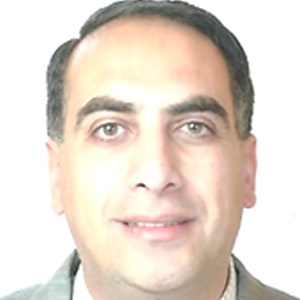
Prof. Mutaz Ali AlQutob is an environmentalist, biogeochemist, and poetry writer. He has published many scientific articles in international journals and has established a quality research laboratory at Al-Quds University.
He is interesting in Aquaculture, heavy metal pollution in food, water and in the environment in general.
Prof. Qutob has published many manuscripts in international journals, including:
I. Al-Khatib, G. Arafeh , M. Qutob, Health Risk Associated with Some Trace and Some Heavy Metals Content of Harvested Rainwater in Yatta Area,
Palestine, Water, 2019, 11, 238
Al-Qutob, M.A. and Al-Rimawi, F. (2016) Analysis of Different Rare Metals, and Rare Earth Metals in Harvested Rain Water in Gaza Strip/Palestine by ICP/MS-Data and Health Aspects. Journal of Water Resource and Protection, 8, 905-912. http://dx.doi.org/10.4236/jwarp.2016.810074
AlQutob M. A., Shqair H., Malassa H., Davis J-M., Al-Rimawi F. (2016), Determination of trace metals in harvested rain water after the November 2012 bombing in Gaza by using ICP/MS, J. Mater. Environ. Sci. 7 (9) 3477-3488.
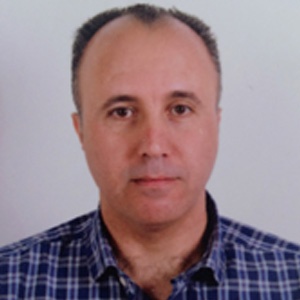
Graduated with a Ph.D. (Dr. rer. nat), Humboldt University, Institute of Biology. Berlin, Germany in Molecular Biology with magna cum laude. , Advisor: Professor Dr Richard Lecius. And the ThesisTitle: Molecular systematics and population structure of the Leishmania major vector Phlebotomus papatasi (Diptera: Psychodidae).
Master degree in Biochemistry and Molecular Biology from Al-Quds University in 2000.
He joined Al-Quds University in 2007 as faculty at the Department of Biology.
Research interests
Working in the field of infectious diseases is extremely important and considered a research priority, I work with colleagues in the Arab countries, especially Libya, Syria, Yemen and Sudan. My research since more than ten years ago was concentrated in the following fields:
• Epidemiology and diagnosis of Leishmaniasis disease in Palestine and the Arab countries
• Molecular biology and population genetic analysis of vectors of infectious diseases, principally vectors of Leishmaniasis using genetic markers (microsatellites, mtDNA and ITS).
• Spatiotemporal and molecular epidemiology analysis of cutaneous leishmaniasis in the Mediterranean.
• Epidemiology of Scabies disease in Palestine
• HIV research in Palestine
• Anti-bacterial and anti-parasitic activity of extracts from Palestinian medicinal plants.
Selected publications: 2020-2021
1. Chebbah, D.; Elissa, N.; Sereno, D.; Hamarsheh, O.; Marteau, A.; Jan, J.; Izri, A.; Akhoundi, M. Bed Bugs (Hemiptera: Cimicidae) Population Diversity and First Record of Cimex hemipterus in Paris. Insects 2021, 12, doi:10.3390/insects12070578.
2. Amro, A, Mansoor, B, Hamarsheh, O and Hjaija, D. 2021. Recent trends in human brucellosis in the West Bank, Palestine. Int J Infect Dis 106,308-313.
3. Omar Hamarsheh. (2021). Epidemiology of Enterobiasis in Palestine, Al-Quds Journal for Academic Research. 1: 63-67
4. Souad Guernaoui, O Hamarsheh, D Garcia, D Fontenille, D Sereno. 2020. Population Genetics of Phlebotomus papatasi from Endemic and Nonendemic Areas for Zoonotic Cutaneous Leishmaniasis in Morocco, as Revealed by Cytochrome Oxidase Gene Subunit I. Microorganisms 8 (7), 1010
5. Omar Hamarsheh and Ahmad Amro. 2020. Epidemiology of parasitic infections in the West Bank and Gaza Strip, Palestine. The American journal of tropical medicine and hygiene 102 (2), 313-317
View all Omar Hamarsheh Publications
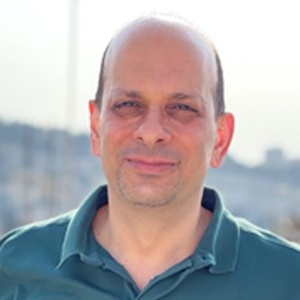
Dr. Zaghal received his Ph.D. in Computer Science from Kent State University in Ohio, USA in 2005, his Master in Computer Science from the American University in Washington DC in 1996, and his Bachelor degree in CS from Yarmouk University in 1993. Currently he is an Assistant Professor, lecturer and researcher at the Computer Science Dept at Al-Quds University (since 1996). His research interests are in Network Theories and Protocols’ Design, Routing Protocols, MANETs, Cloud-Computing, Mobile Applications and Software Engineering Tools and Modeling. He had advised many Master students on research projects in these fields and published more than 35 articles in peer-reviewed Journals and international conferences.
He served as the head of the Computer Science Department for two terms (5 years total), and the head of the Dual Studies in IT department for one term (3 years total).
During the past 25 years, he had participated in many developmental and research projects for the development and advancement of the CS department and AQU in general.
Courses taught: Undergraduate level: Introduction to Computer Science, Computer Programming Using Java, Object-Oriented Programming, Software Engineering, Data Structures and Algorithms, Computer Networks, Creative Design for IT, Skills for the Workplace, Compiler Design. Graduate level: Advanced Computer Networks and Communication, and Advanced Software Engineering. Programming Languages Design.
Selected Publications (from the last 10 years only):
- Salah, S., Nassar, M., Zaghal, R., & Hamed, O. (2021). Towards the automatic generation of Arabic Lexical Recognition Tests using orthographic and phonological similarity maps. Journal of King Saud University-Computer and Information Sciences, Elsevier (in the press).
- Salah, S., Abu Alhawa, M., Zaghal, R., (2021). Desktop and mobile operating system fingerprinting based on IPv6 protocol using machine learning algorithms . Int. J. Security and Networks (In the press).
- Abdeljawad, M., Salah, S., Zaghal, R., (2020). DSDV EXTENSION TO ENHANCE THE PERFORMANCE OF AD HOC NETWORKS IN HIGH DIVERSE-VELOCITY ENVIRONMENTS. International Journal of Interactive Mobile Technologies (iJIM), Vol. 14, No, 6.
- Madaa Abdeljawad, Saeed Salah and Raid Zaghal, PERFORMANCE COMPARATIVE STUDY OF DSDV, E-DSDV, I-DSDV AND O-DSDV MANET ROUTING PROTOCOLS”. World of Computer Science and Information Technology Journal (WCSIT), Vol. 8, No. 4., 2018.
- Raid Zaghal, Saeed Salah, and Fadi Alyounis, “A SURVEY OF FOUR ROUTING PROTOCOLS FOR WIRELESS SENSOR NETWORKS”, International Journal of Digital Information and Wireless Communications (IJDIWC), Vol. 7, No. 1, Jan. 2017, Pages 49-59.
- Raid Zaghal and Imad Abu-Saadah, “MANET ROUTING PROTOCOLS: COMPARATIVE STUDY”. Journal of Al-Quds Open University for Research and Studies, No. 30, Part (1), June 2013.
- Zaghal, R., Faraj, M., Mubada, A. (2018, October). Al-Basma School for Children with ASD – Lessons Learned From The Open-Doors Policy And The Real-Life Stations. The International Conference on Science and Education (ICONSE), Antalya, Turkey.
- Zaghal, R., Salah, S., Nassar, M. (2018, October). Towards The Automatic Generation Of Diacritized Arabic Lexical Recognition Tests. The International Conference On Science And Education (ICONSE), Antalya, Turkey.
- Zaghal, R., Salah, S., and Jabali, N. (2018, March). Extending AES With DH Key-Exchange to Enhance VoIP Encryption in Mobile Networks. The 6th World Conference on Information Systems and Technologies, Naples, Italy.
- Zaghal, R., Ismail, M. Salah, S. (2018, Feb). An Infiniband-Based Mechanism to Enhance QoS In Multipath Routing Protocols In MANETs. The 9th IEEE /IFIP International Conference On New Technologies, Mobility & Security, Paris, France.
- Zaghal, R., Thabateh, K. Salah, S. (2017, July). Towards a Smart Intersection Using Traffic Load Balancing Algorithm. SAI Computing Conference, London, UK.
- Zaghal, R., Alyounis, F., Salah, S. (2016, Nov). Performance Evaluation of Routing Protocols in Wireless Sensor Networks: A Comparative Study. Proceedings of The Fifth International Conference on Informatics and Applications, Takamatsu, Japan.
- Zaghal, R., Zayyad, M. (2017, May). Blending Modern Teaching Methods and Information Technology Tools in University-Level Course Development. International Conference on Research in Education And Science, Ephesus Kusadasi, Turkey.
- Hamamreh, R., Jamoos, M., Zaghal, R. (2014, Dec). DILH: Data Integrity Using Linear Combination For Hash Algorithm. IEEE World Symposium On Computer Applications & Research (WSCAR), Tunisia.
- Osrof, M. Zaghal, R. (2012, Dec). Ontology Based Business Rules Extraction Model and Algorithm (OBBREMA). Proceedings of The 12th International Arab Conference on Information Technology (ACIT’2012), Zarqa, Jordan.
- Zayyad, M, Zaghal, R. (2012, July). Instructional Design and Course Development in Computerized Environment. The 1st International Conference on E-Learning in The Arab World, Egyptian E-Learning University (EELU). Cairo, Egypt.
- Zaghal, R., Sbeih, A. (2012, June). Arabic Morphological Analyzer With Text To Voice. The 2nd International Conference on Communications and Information Technology (ICCIT-2012), Hammamet, Tunisia.
- Zaghal, R., Fahel, A. (2012, June). Improving Software Security in Software Design Models. The 7th Iberian Conference On Information Systems And Technologies (CISTI’2012), Madrid, Spain.
- Zaghal, R., Abu-Kamel, A. (2010, July). A Comparison Among EJB And COM+ Applications Case Study: Response Time and Scalability, The Second International Conference on Networked Digital Technologies (NDT’2010), Prague, Czech Republic.
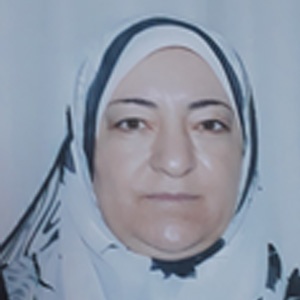
Mrs. Reem Yaghmour is a lecturer in biology department in college of Science &Tecnology. Finished the secondary school in 1981, then graduated from Alquds university &started work with Bachelor degree in1985 as a laboratory assistant, continued graduate studies& have a diploma degree in” Teaching Science” in 1986, Then in 1997 she had been graduated from AN-Najah university with Master in biology, worked there for one year & then returned back to Alquds university asstaff teaching member. She had been shared in some committies in the college ,designing& description of related courses.
Publications Books:
1. Ali-Shtayeh M.S., Jamous R., Yaghmour R.M-R (1997) Mycology Manual. Dept. of Biological Sciences Al-Najah National University. Nablus.
2. Sawalha K.S., Khanfur H, Yaghmour R.M-R., (2005) Micro-Technique lab manual. Al-Quds University. Palestine.
Articles:
Ali-shtayeh M.S., AL-Nuri M.Z., YaghmourR.m.r., Faidi Y.R.,(1997) Antimicrobial activity of Micromeria nervosa (Desf) Benth from the Palestinian area “Journal of Ethnopharmocologyvol 58, 143-147.
Ali-Shtayeh M.S., Yaghmour R.M.R., Faidi Y.R., Salem K. Al-NuriM.A., (1998) Antimicrobial of 20 plants used in folkloric medicine in the Palestinian area. Journal of Ethnopharmocology vol. 60 (265-271).
RafikKaraman, Samia Al- Kurd, ReemYaghmour, Ahmad Amro, DoniaKaraman. (2015) Antibacterial activity of Novel Prodrugs of Amoxicillin & Cephalexin. “World Journal of Pharmaceutical Research”.Volume 4,Issue 9,331-360.
. RafikKaraman, Mustafa Khamis, JehadAbbadi, MohannadQurie, Ibrahim Ayyad, Fatima Ayyash1, Omar Hamarsheh, ReemYaghmour, Ahmad Amro1, ShlomoNir, Sabino A. Bufo and Laura Scrano, Sofia Lerman, Shirra Gur-Reznik, and Carlos G. Dosoretz . ( 2016) Biodegradation of paracetamol by activated sludge and photo-catalysis and its removal by a -micelle- clay complex, activated charcoal and reverse osmosis membranes. Environmental Technology.
Omar Hamarsheh, KifayaAzmi, Ahmad Amro, Martina Schultheis, ZiadAbdeen, Abed Nasseredin, RebumaFirdessa,KhaledSawalha, Fuad al-Rimawi, ReemYaghmour, Heidrum Moll. (2017) Antilishmanial activity of crude plant extracts derived from medicinal plants in Palestine. Ann ClinCytolPathol 3 (4), 1065
Saleh Abu-Lafi , Mahmoud Sami Al-Natsheh , ReemYaghmoor , Fuad Al-Rimawi (2017) Enrichment of Phenolic Compounds from Olive Mill Wastewater and in-vitro Evaluation of their Medicinal Activities. Evidence Based Complementary & alternative Medicine, Vol.2017, 9 pages.
Other Activities
A. Workshop – Distance Learning and Quality Assurance.
– National Roundtables on Higher Education for Palestinian Faculty Development Program{PFDP}.On December 3rd – 4th 2011 Ramallah.
B.Member of Association for Integrated Rural Development “AIRD”-Ramallah.
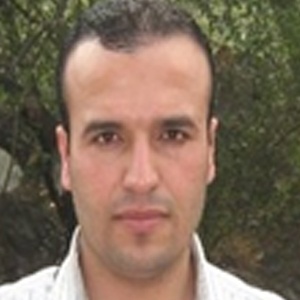
Dr. Salah is an Assistant Professor and researcher at the Department of Information Technology – Faculty of Dual Studies at Al-Quds University in Jerusalem. He received his BSc. in Electrical/Computer Engineering from Al-Najah National University in 2003, his MSc. degree in Computer Science from Al-Quds University in 2008, and his Ph.D. from the Department of Signal Theory, Telematics and Communications of the University of Granada in 2015. His research interests are focused on network management, information and network security, machine learning, data mining, MANETs, routing protocols, E-leaning, and natural language processing.
Dr. Salah published many peer-reviewed research papers in recognized international journals and conferences. Moreover, he acts as a reviewer for a number of journals in his field.
S. Salah, G. Maciá Fernández and J. E. Díaz-Verdejo, “A Model-based Survey of Alerts Correlation Techniques”, Computer Networks (Elsevier), Vol. 57, pp. 2718-2732, (2013).
S. Salah, G. Maciá Fernández, J. E. Díaz-Verdejo and Leovigildo Sánchez-Casado, “A Model for Incident Tickets Correlation in Network Management”, Journal of Network and Systems Management (Springer), Vol. 24, Issue 1, pp 57-91, (2015).
R. Zaghal, S. Salah and F. Al-Younis, “A Survey of Four Routing Protocols for Wireless Sensor Networks”, International Journal of Digital Information and Wireless Communications – IJDIWC, Vol. 7, No. 1, pp: 49-59, (2017).
S. Salah, G. Maciá Fernández and J. E. Díaz-Verdejo, “Fusing Information from Tickets and Alerts to Improve the Incident Resolution Process”, Information Fusion (Elsevier), Vol. 45, pp: 38-52 (2018).
M. Abdel Jawad, S. Salah, and Raid Zaghal, “Performance Comparative Study of DSDV, E-DSDV, I-DSDV and O-DSDV MANET Routing Protocols”, The World of Computer Science and Information Technology Journal (WSCIT). Vol. 8, Issue 4, pp: 24.31 (2018).
M. Abdel Jawad, S. Salah, and Raid Zaghal, “DSDV Extension to Enhance the Performance of Ad Hoc Networks in High Diverse-Velocity Environments”, the International Journal of Interactive Mobile Technologies (IJWI), Vol. 14, No. 6, 2020.
S. Salah, M. Abu Alhawa, and Raid Zaghal, “Desktop and Mobile Operating System Fingerprinting based on IPv6 Protocol using Machine Learning Algorithms”, Accepted for publication in the International Journal of Security and Networks, InderScience, 2021.
S. Salah and M. Thabet “E-Learning Management Systems: A Feature-based Comparative Analysis”, Journal of Information Systems and Technology Management (JISTEM), SciELO – Scientific Electronic Library Online, Vol. 18, 2021.
S. Salah, M. Nassar, R. Zaghal, and O. Hamed “Towards the Automatic Generation of Arabic Lexical Recognition Tests Using Orthographic and Phonological Similarity Maps”, Journal of King Saud University – Computer and Information Sciences, Elsevier, Article in Press, 2021.
R. Zaghal, F. Al-Younis and S. Salah, “Performance Evaluation of Routing Protocols in Wireless Sensor Networks: A Comparative Study”, In Proceedings of the 5th International Conference on Informatics and Applications (ICIA2016), Takamatsu, Japan, 14-16 November 2016.
R. Zaghal, K. Thabatah and S. Salah, “Towards a Smart Intersection Using Traffic Load Balancing Algorithm”, In Proceedings of the IEEE International Computing Conference, London, UK, 18-20 July 2017.
Alhazmi, G. Maciá Fernández, J. Camacho, and S. Salah, “Torrent Forensics: Are your Files Being Shared in the BitTorrent Network?”, In Proceedings of the 2nd International Conference on Cyber-Technologies and Cyber-Systems (CYBER 2017), Barcelona, Spain, 12-16 November 2017.
M. Jamal, R. Zaghal and S. Salah, “Adaptation of InfiniBand Model in Enhancing the QoS Parameters in Mobile AdHoc Routing Protocols”, In Proceedings of the 9th IEEE/IFIP International Conference on New Technologies, Mobility & Security, Paris, France, 26-28 February 2018.
R. Zaghal, S. Salah and N. Jabali, “Extending AES with DH Key-Exchange to Enhance VoIP Encryption in Mobile Networks”, In Proceedings of the 6th International Conference on Information Systems and Technologies, Naples, Italy, 27 – 29 March 2018.
R. Zaghal, S. Salah & M. Nassar, “Towards the Automatic Generation of Discretized Arabic Lexical Recognition Tests”, International Conference on Science and Education (IConSE), October 26-29, 2018, Antalya, Turkey.
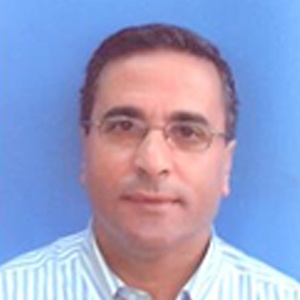
Yousef Zahaykah, Ph.D. is assistant professor of Applied Mathematics and Numerical Analysis at the Department of Mathematics, Faculty of Science at Al-Quds University in Palestine, since 2004. During 2002-2004 he used to hold a research position in the Institute of Numerical Analysis (IAN) at The University of Magdeburg in Germany. Moreover, during 1990-1991 he was an instructor of Mathematics at the Arab Society College in Amman, Jordan and from 1991 to 1997 he was also an instructor of Mathematics at the Department of Mathematics, Faculty of Science at Al-Quds University in Palestine.
Mr. Zahaykah received the scholarship of DAAD (The German Academic Exchange Service) for short visit research at the Institute of Numerical Analysis (IAN) in the University of Magdeburg in Germany from June 2006 to August 2006.
The Educational Background of Mr. Zahaykah is as follows:
▪ 2002 Ph.D. in Mathematics- Numerical Analysis for Partial Differential Equations (Scholarship from DAAD) at University of Magdeburg, Germany.
▪ 1989 M.Sc. in Mathematics (Scholarship from Al-Quds University).The University of Jordan, Amman, Jordan.
▪1987 B.Sc. in Mathematics (Scholarship from School of Arab Institute), Abu-Dies, Jerusalem, Palestine.
Mr. Zahaykah has more than 20 years’ experience in teaching university mathematics, applied mathematics and numerical analysis courses both at the levels of undergraduate and graduate studies. He also supervised several M.Sc. students in the field of applied mathematics and numerical analysis and published several papers in the field of numerical methods for partial differential equations.
▪ (with M. Lukáĉová-Medvid’ová and G. Warnecke).
Third order finite volume evolution Galerkin (FVEG) methods for two-
dimensional wave equation system. J. Numer. Math. (2003) 11(3):235-251.
▪ (with M. Lukáĉová-Medvid’ová , G. Warnecke and J. Saibertová)
On evolution Galerkin methods for the Maxwell and the linearized Euler
equations. App. Math. (2004) 49(5):415-439.
▪ (with M. Lukáĉová-Medvid’ová and G. Warnecke).
On the boundary conditions for EG-methods applied to the two-dimensional
wave equation system. Z. Angew. Math. Mech. (ZAMM) (2004) 84:237-251.
▪ (with M. Lukáĉová-Medvid’ová and G. Warnecke).
On the stability of the evolution Galerkin schemes applied to a two-dimensional
wave equation system. SIAM J Numer. Anal. (2006) 44(4):1556-1583.
▪ (with M. Lukáĉová-Medvid’ová and G. Warnecke).
Finite volume evolution Galerkin (FVEG) methods for three-dimensional wave
equation system. App. Numer. Math. (2007) 57:1050-1064.
▪ (with Q. ul-Ain and G.Warnecke).
On the finite volume evolution Galerkin (FVEG) methods for two-dimensional
Euler equations on triangular meshes. J. Eng. Math. Theor. Appl. (JEMTA)
(2007)2:8-31.
The research interests of Mr. Zahaykah are:
▪ Hyperbolic systems of conversation laws- truly multidimensional methods.
▪ Numerical methods for PDEs (Maxwell equations and Euler equations)
▪ Numerical methods for Fredholm integral equations and approximate solution of
Einstein Fields equation.
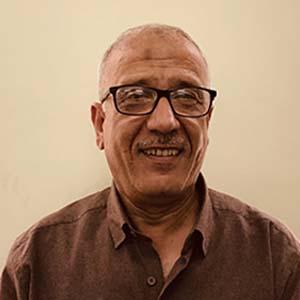
Education
1987-1988 MSc in Organic Chemistry
(Heterocyclic Chemistry) Salford University
( United Kingdom)
1979-1983 BSc in Chemistry
Jordan University
Work experience
1983 – 1988
1992-presemt Chemistry Teaching Assistant
Lecturer in Organic Chemistry
Main duties performed:
• Working alongside my colleagues to provide consistent education for all students
• Regularly instructing experiments and teaching students how to replicate the experiments under safe conditions
• Writing and marking examination papers
• Marking homework, quizzes and tests
• Educating students on the health and safety regulations in a lab
• Working with students on both an individual and group basis on activities and workbooks
• Monitoring students’ work performance
I have enjoyed an extensive career teaching students Chemistry, which has allowed me to gain substantial knowledge and expertise in education, besides vastly, improved my teaching abilities. I also believe that my friendly personality and calm temperament are very harmonious with the requirements of a good lecturer. My communication skills are excellent; as are my interpersonal skills—which are useful during interactions with students, and administrators alike.
In addition to education, I participate in the administrative system as a director of registration and as a coordinator of the academic load of the university.
Featured News
 March 19, 2025
March 19, 2025
 March 19, 2025
March 19, 2025
 March 19, 2025
March 19, 2025
 March 18, 2025
March 18, 2025
 February 26, 2025
February 26, 2025
 February 22, 2025
February 22, 2025



